What are Online Travel Agents (OTAs)? A Guide for Tour Operators

By Kevin Tjoe — 26 May 2014
agents distribution OTAs tourism business strategy
Updated April 2023 – Online Travel Agents (OTAs) can provide your tours and activities with massive exposure. To distribute tours and activities globally, you’ll need to partner with them, so here’s everything you need to know about working with OTAs, how they differ from partnering with travel agents , and the meaning of OTA in travel.

What is an OTA in travel?
Online travel agents are basically traditional travel agents, except customers self-serve, as they operate online. They are websites where consumers can conduct multiple searches, and plan and place an order for a booking.
Popular OTAs for tour operators
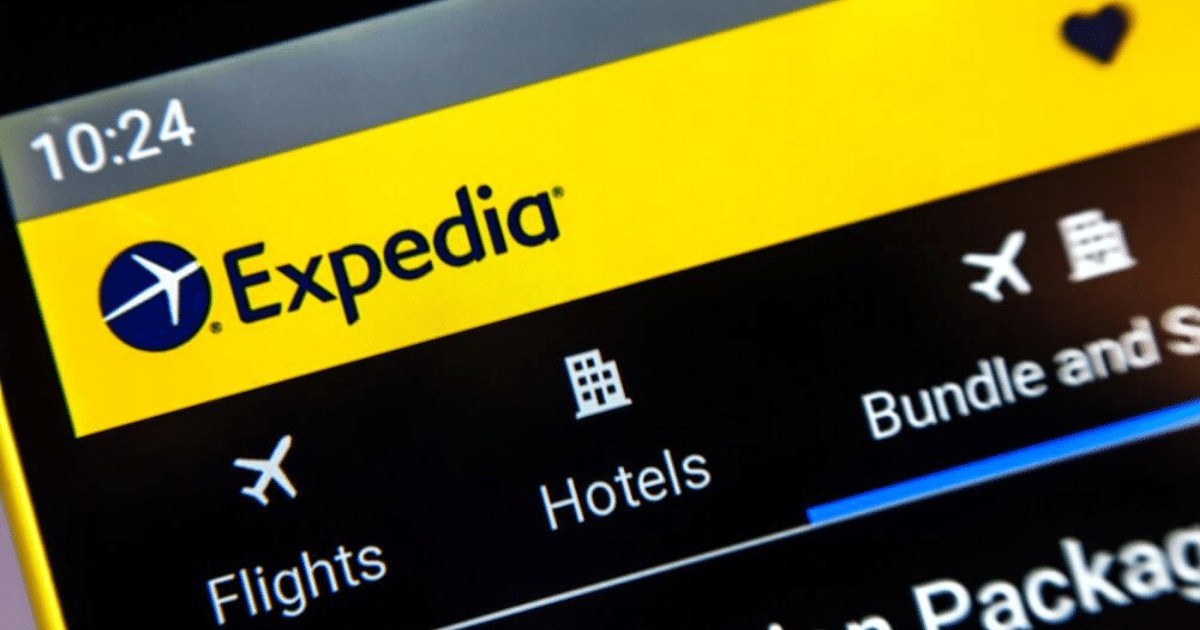
With a global presence in over 70 countries, Expedia receives over 58 million unique visitors each month, and its mobile apps are downloaded nearly 80 million times at a rate of over 200 downloads per minute. Apply to be listed on Expedia here!

Unlike Expedia, Viator is wholly focused on tours and activities. It sells its products to a global consumer base at Viator.com, 60 additional consumer-facing websites, mobile websites and apps, and through its global network of affiliates. Viator’s listings are supported by more than 500,000 reviews, photos, and videos posted by travelers. It boasts 7 million visitors per month. Apply to be listed on Viator here!
Get Your Guide

GetYourGuide focuses on listing activities based on where they are, rather than specifically what they are. This captures the market of people who decide what they want to do once they are already in a location and can put your product in front of whole new audiences who might not have even known that you exist. GetYourGuide receives an average of 2.5 million website visitors per month. Apply to be listed on GetYourGuide here!
Why work with an OTA?
In a word: exposure. This leads to more bookings and revenue. Online Travel Agents receive millions of website visitors every month from all over the world. They have cultivated a reputation for themselves as an authority on all things travel-related. People trust the recommendations they receive from OTAs, so by being listed on an OTA travel/ tour platform not only do you reach an audience of millions that you wouldn’t have otherwise reached, but they find you on a reputable source of information, which makes you look good as well.
Reach a wider audience
OTAs have revolutionized the tourism industry by providing a platform that enables tour and activity businesses to reach a wider audience. These platforms offer a one-stop shop for travelers to book everything they need for their trip, from flights and hotels to tours and activities. The OTA booking system provides a convenient and accessible way for travelers to book their desired activities and experiences.
By partnering with OTAs, tour and activity businesses can expand their reach to a global audience without the need for extensive marketing efforts. The OTA booking system provides access to a vast customer base, which may be difficult for individual businesses to reach on their own. Additionally, OTAs have a strong online presence, which means that their website is highly visible on search engines like Google, making it easier for travelers to find and book activities.
Streamline bookings
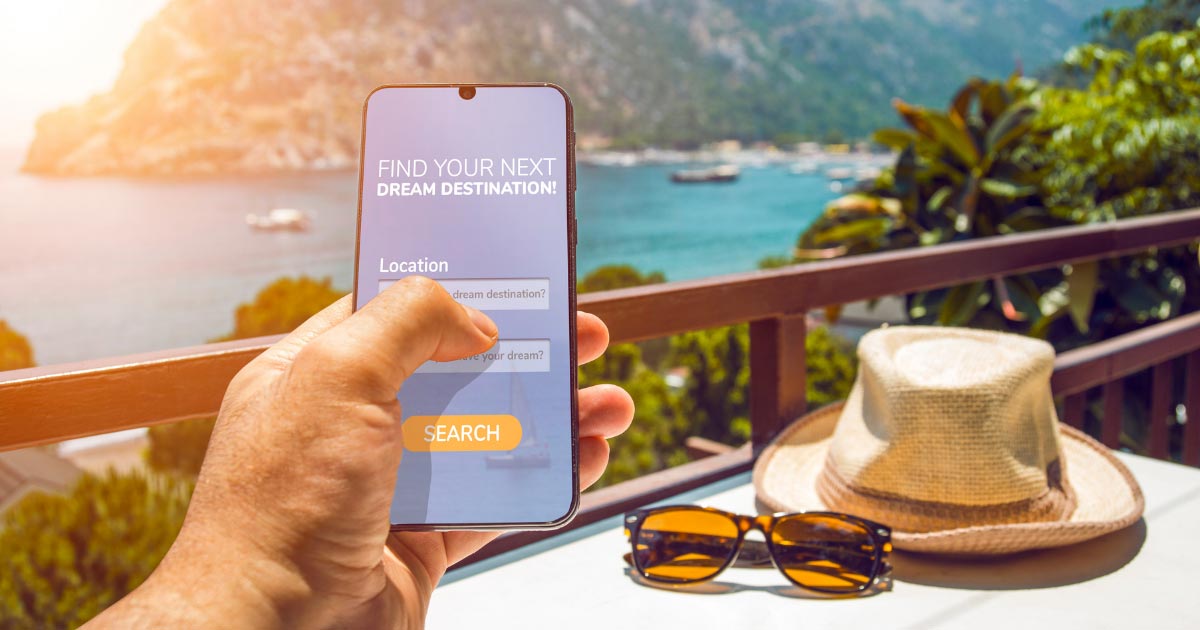
OTAs offer a user-friendly booking process, which is easy to navigate and understand. This is especially important for travelers who may not be familiar with the tour and activity business they want to book with or the destination they are visiting. OTAs provide detailed information about the tours and activities, including pricing, availability, and reviews from other travelers, making it easy for customers to compare and choose what they want.
On a similar note, OTAs allow businesses to use a central platform for booking and managing reservations. This means that businesses do not have to worry about managing bookings through multiple channels, such as phone or email. Instead, all reservations can be managed through a single platform, making it easy to keep track of bookings, manage availability, and update information.
Market your tours through an OTA
OTAs have a large customer base, which means that your tours will be visible to a much broader range of potential customers than if you were to rely solely on your own marketing efforts.
By listing your tours on an OTA travel platform, you can take advantage of the OTA’s marketing and advertising campaigns to promote your tours. This can include targeted emails, social media campaigns, and online advertising, all of which are designed to reach customers who are interested in the types of tours and activities you offer.
In addition, OTAs often have strong search engine optimization (SEO) capabilities, which means that your tours are more likely to appear at the top of search results when customers are searching for tours in your destination. This can help to increase your visibility and attract more customers to your business.
Reduce costs
As well as minimizing your marketing costs, listing your tours on an OTA platform can also help you reduce your distribution costs. OTAs typically charge a commission on each booking, but this cost is often lower than the cost of distributing your tours through other channels, such as travel agents or direct sales. This is because OTAs have already invested in the infrastructure required to market and sell tours, which means that you do not have to bear these costs.
What are the costs of working with an OTA?
Partnering with resellers, including OTAs, can be a cost-effective way for tour and activity businesses to expand their reach and generate more bookings. However, there are certain costs of partnering with resellers , including OTAs . These costs include:
- Commission: OTAs typically charge a commission on each booking, which can range from 10% to 25% of the tour price, depending on the platform and the type of tour. This commission is a cost that businesses need to factor into their pricing strategy and profit margins.
- Listing: While it is usually free to list tours on an OTA platform, some platforms may charge a listing fee or require businesses to pay for premium placement in search results. These costs can add up, particularly for smaller businesses that are trying to manage their marketing budgets.
- Payment processing: Some OTAs offer payment processing services, which means that businesses do not have to manage payments themselves. However, these services often come at a cost, such as a per-transaction fee or a percentage of the transaction value.
- Contractual obligations: When partnering with OTAs, businesses may be subject to certain contractual obligations, such as minimum availability requirements, cancellation policies, and commission rates. Failing to comply with these obligations can result in penalties and additional costs.

Tips for tour operators partnering with an OTA
Before partnering with OTAs, there are a few things you need to be aware of in terms of the information that they will most likely expect you to provide. There is no guarantee that every tour operator will be listed, but if you can provide these things it will go a long way towards improving your chances.
Offer real-time availability to travelers
Online Travel Agents want to offer their customers real-time booking confirmation, this means you need to be able to provide bookable spots for your tours or activity in real-time as well as update your availability in real-time as it changes.
Allow last-minute bookings
Allow last-minute bookings and specify how many hours before the tour starts your customers can book. Of course, you need enough time to prepare your tour before people come, but keep your minimum notice as close to the starting time of your experience as you can. Bearing in mind that a lot of travelers book activities on quite short notice, OTAs want to be able to provide this option for all of their listed activities. As such, it is advisable that you keep your cut-off time as close to the start of the activity as you can.
Leverage tour booking software

Not only technical, but also in the customer experience. For starters, your customer booking software should have a solid API integration with the OTA. You’d want to avoid manual work as much as possible. When sharing your availability with the OTA, you want the booking information pushed into your booking software, so it automatically populates your CRM , sales reports , and manifest . This will avoid lost customers and makes it easy to keep control over your bookings, even when it’s a large volume.
Accept bookings as much as 2 years in advance
Schedule your availability for 2 years and make sure people can book 2 years in advance. It’s good practice to make sure all your availability is published across as many channels as possible, but make sure it’s also available for a long time – the earlier you fill up your tours the better. Online Travel Agents attract a lot of people who are exploring your destination. Travelers want to know what they’ll get to see and do in your destination before they book their hotels and tours. Some travelers take up to 2 years to prepare for their trips, so make sure you always have the availability to attract them to your destination. Of course, as we said, short-term availability is important as well, but it’s best to cater to as wide a range of booking behaviors as possible.
Stand out with beautiful pictures of your destination
A picture speaks a thousand words and makes your product stand out from the rest. Be aware that your product is listed next to your competitors’ and the best picture is likely to receive the booking. Having nice, high-resolution pictures and videos will help you stand out and will always make your listing look professional, no matter where it’s being promoted.
Write unique product descriptions for each OTA
It’s perfectly acceptable to have your product listed on multiple Online Travel Agents. However, you need to have different descriptions for your product on each of them. Spend some time writing a special description for your tour specifically for each OTA’s listing. This is because of curation – OTAs want unique descriptions because they are easier to get to the top of the list of search engine responses. Look at the listings already on each OTA and use this format. Don’t have any weird formatting, inconsistent symbols, special offers, or your email address in the product description when you submit it.
Make the most out of your OTA partnership
Working with OTAs is a good strategy, but can be difficult to manage on an ongoing basis without the right technology to back you. How can you ensure that you don’t overbook tours when selling on multiple channels? How can availability be constantly up to date across your various distribution channels (without doing hours of admin work)?
Rezdy’s Channel Manager softwar e exists to do exactly that. Our Channel Manager lets you update your availability across all your distribution channels from one place. This in combination with the OTAs we integrate with offers you some formidable distribution strategy options.
Start accepting online bookings with Rezdy. Start your FREE 21-day trial or book a demo with our team of experts today.
If you enjoyed this article, be sure to subscribe to the Rezdy newsletter , where you’ll receive weekly up-to-date learnings and news from the Experiences industry; straight into your inbox.
Want to take your distribution strategy to greater heights?

Start accepting online bookings with Rezdy
Enjoy 21 days to take a look around and see if we are a good fit for your business.
No obligations, no catches, no limits, nada

The benefits of becoming a GetYourGuide supplier

How much does it actually cost to partner with an OTA?

Why Should Tour Operators List Their Products with OTAs?
ColorWhistle
Digital Web Design Agency India

Explore our Market-Fit Services
We ensure to establish websites with the latest trends as we believe that, products whose value satisfies the needs of the market and its potential customers can be efficiently successful.
Quick Links
- About Us – ColorWhistle
- Engagement Models
- Testimonials
- Case Studies
- Agency Services
- Web Development
- Web App Development
- Digital Marketing
- Travel Website Development Services Company
- Real Estate Website Development Services Company
- Education Website Development Services Company
- Healthcare Website Development Services Company
- Hotel and Restaurant Website Development Services
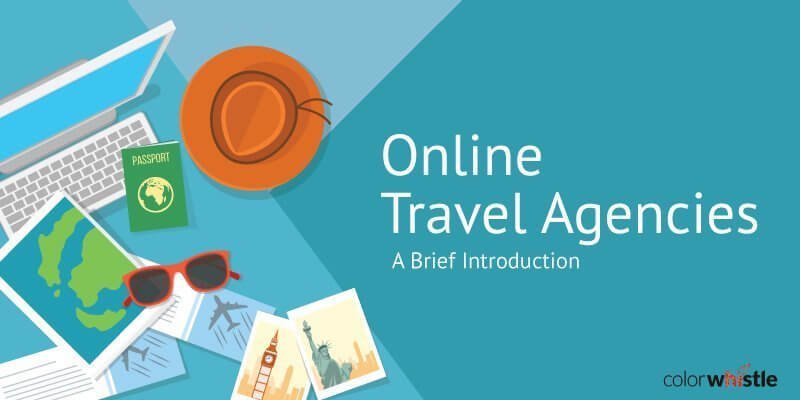
Category: Travel
Date: October 20, 2023
Online Travel Agencies – A Brief Introduction
The role of an online travel agency (OTA) is becoming increasingly important in the accommodation industry as they provide a convenient way for travelers to arrange their stay. From the comfort of their home, travelers can compare hotel prices and book them over the internet.
In this blog, we are going to discuss what an OTA is, the best OTA platforms, travel website development and how to do it right, and more.
Ready? Let’s go.
What Are Online Travel Agencies?
An online travel agency (OTA) arranges and sells accommodations, tours, transportation and trips on an online platform for travelers. They are third parties who sell services on behalf of other companies.
Usually, these OTAs offer many benefits with added convenience with more of a self-service approach. They also include a built-in booking system which allows instant bookings.
How Do Online Travel Agencies Work?
OTAs generally work on two models. They are,
1. Merchant Model
In this model, hotels sell rooms to OTAs at a discounted or wholesale price. Then, the OTA sells them to the customer at a markup price
2. Agency Model
This is a commission-based model where OTAs acts as a distribution partner. OTAs receive full commission after the stay has taken place. The hotel directly receives the payment from the end customer and does not wait for the payment transfer from third-party distributors.
What Are the Benefits of Partnering with Online Travel Agencies?
In one word – exposure! Online travel agents get thousands of website visitors from all over the world. Plus, they have positioned themselves as an authority on everything related to travel. So, people trust the recommendation they receive from OTAs.
By listing in OTAs, accommodation businesses like hotels not only reach a vast set of audience but will also find their service among many other reputable sources of information.
In addition, hotels that are listed on OTAs can also benefit from what is referred to as the ‘billboard effect’. This means that OTAs provide a form of advertising for service providers such as hotels on their platforms. Once the user gains this awareness, they may even go to the website of that particular hotel to make a direct booking.
What Are the Advantages and Disadvantages of Selling Through Online Travel Agents?
Accommodation businesses like hotels and B&Bs have pros and cons of getting listed in OTAs. Let’s take a look at them.
Advantages Of Online Travel Agents
- Low-cost method of selling accommodation services
- Reduced online marketing spend as OTAs invest in advertising to attract potential customers
- Impartial reviews give customers the confidence to book
- Users can easily compare various accommodation costs at one place
Disadvantages Of Online Travel Agents
- Commission rates are charged on every sale. It can range between 10-15% of the gross cost
- Restrictive cancellation terms
- Even if accommodation businesses use OTAs, the need for their own website and booking engine does not go away
- Investment in a balanced multi-channel strategy may be needed to boost sales
Even though OTAs can help to fill your rooms, accommodation businesses must try to maximize revenue through their own website. Consistent work on search engine optimization tactics and other digital marketing techniques is a must. Accommodation businesses must focus on customer retention techniques and directly target their existing customers through emails and direct marketing.
How To Start An Online Travel Agency?
Travel agencies no longer inform customers about the availability of flights and rooms. They issue rooms and get a commission from the respective accommodation businesses. That is why most of the new travel businesses follow the OTA model.
If you plan to enter the OTA arena, you can specialize in pilgrimages, leisure travel, business travel or any niche. But, focusing on how effectively you offer things is the key to success.
Here Are Some Points You Have To Consider When Starting An Online Travel Agency.
- Register the name of your agency and if applicable, take a license as per your local laws
- Try to get a membership in IATA or any other reputed travel organization
- Gain more knowledge about the travel industry and particularly the nice you want to concentrate
- Get your travel website designed by a professional company like ColorWhistle
- Offer deals that focus on a specific geography. Focusing on a particular niche will also bring more success
- Publicize your business in the online space
- Utilize the power of blogging
- Create a good social media presence
Why Do People Use Online Travel Agencies?
here are some of the main reasons they prefer ota’s..
- Few OTAs offer reward programs which can be used for future travel needs
- Special rates which cannot be found elsewhere
- Some OTAs may have generous cancellation policies. For example, Priceline does not offer any penalty if the user cancels the ticket until the end of the next business day
- Most users may not have an idea on where to book other than an OTA
- OTAs make it easy to compare different rates
Who Are the Top Online Travel Agents?
1. booking.com.
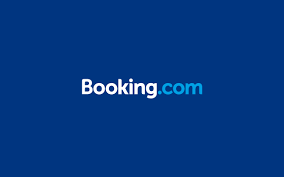
Booking.com is one of the largest accommodations websites which has now expanded to smaller markets such as family-operated bed and breakfast, vacation rentals and self-catering apartments.
Interesting statistics
- Every day, 1,550,000 nights are booked
- 68% of nights booked came from families and couples
- 42% of nights booked came from unique places such as homes and apartments
- 38% of reviews are given by guests which are useful for other travelers
- 75% of nights booked come from guests who booked more than 5 times
2. Expedia’s Hotels.com
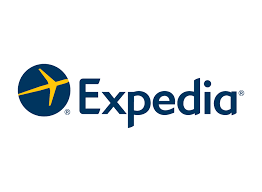
Expedia’s Hotels.com is a popular brand which has a global audience and attracts diverse travelers. The company gained more power in the industry by acquiring Travelocity.
- Gets over 675 million monthly site visits
- Operates in 70+ countries and 40+ languages
- Attracts 75 million monthly flight shoppers
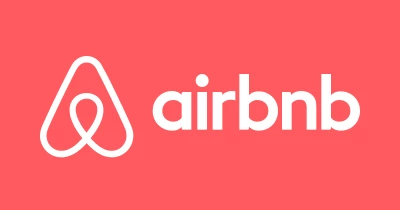
Airbnb revolutionized the travel accommodation industry by introducing home-sharing. The website has diverse listings and travelers get a sense of safety as they can know their guest’s identity.
- 2.9 million hosts are present on Airbnb
- Average of 800k stays each night
- 14k new hosts join every month
Apart from these major OTAs, there are many small ones such as OneTravel, Vayama, Tripsta, TravelMerry, ExploreTrip, Kiss&Fly, Webjet, GoToGate, Travelgenio, Bookairfare, Fareboom, Skybooker, Travel2be, OneTwoTrip!, and eBookers.
Drive Conversions and Boost your Business with Expert Travel Website Development.
What the future holds for online travel agencies.
It is clear that, in the near future, accommodation businesses are not about to back down from OTAs. They are enjoying the billboard effect and trying their best to retain website visitors and convert them into direct booking.
Sure, there is a cost involved. The upside of this is that accommodation businesses are working hard to create a loyal customer base that will continue to seek direct bookings.
The chances of OTAs suffering in the long run are pretty slim. Smaller accommodation businesses have a lot to gain from the exposure they receive through OTAs. Plus, a large portion of the younger generation prefers OTAs. So their market will continue to grow.
If you need any help to design, develop or market an OTA website, contact our travel web design and development experts at ColorWhistle .
We can create an amazing website with beautiful designs combined with dynamic content such as live rates and special offers. Contact us today for your free business analysis and consultation.
In quest of the Perfect Travel Tech Solutions Buddy?
Be unrestricted to click the other trendy writes under this title that suits your needs the best!
- Travel Meta Search Engine
- GDS Travel Agency Guide
- GDS OTA Travel Meta Searchengines
- Travel Aggregator Website
- Best Travel Websites Inspiration
- Travel Website Features
- Top WordPress Travel Website Themes
Related Posts

Exploring the World Through AI and VR in the Travel Industry
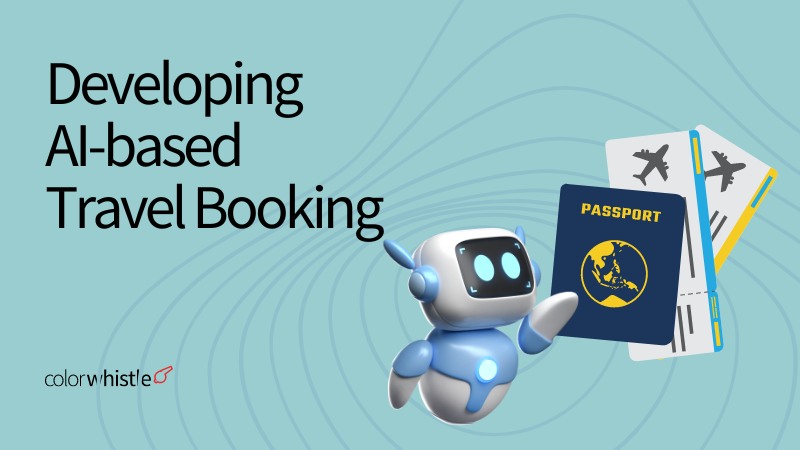
How AI-based Travel Booking Applications Can be Developed?
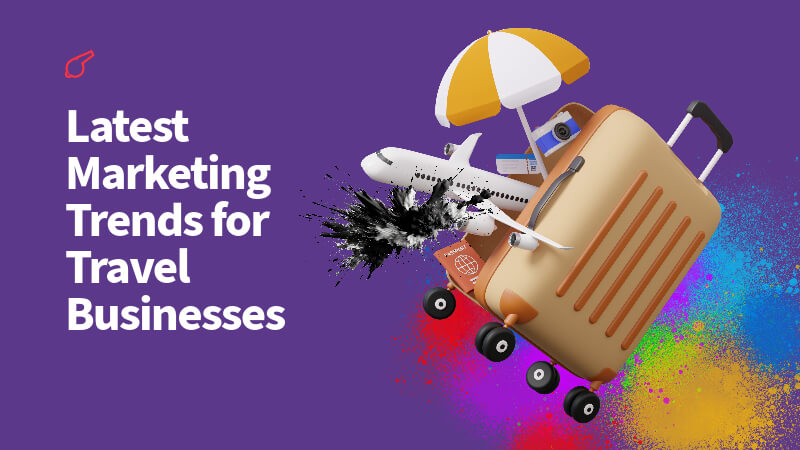
Latest Marketing Trends for Travel Businesses in This New Year
About the Author - Anjana
Anjana is a full-time Copywriter at ColorWhistle managing content-related projects. She writes about website technologies, digital marketing, and industries such as travel. Plus, she has an unhealthy addiction towards online marketing, watching crime shows, and chocolates.
View Our Services
Have an idea? Request a quote
Share This Blog
its a good website i love it
i think it is a great website i love it so much but i need more information about what am looking for. thanks
It is a good website and I need more information for learning
I learned a lot through this web.
Leave a Reply Cancel reply
Your email address will not be published. Required fields are marked *
Ready to get started?
Let’s craft your next digital story

Sure thing, leave us your details and one of our representatives will be happy to call you back!
Eg: John Doe
Eg: United States
Eg: [email protected]
More the details, speeder the process :)
Exciting news! We've launched a new website for Expedia Group partners. As you explore this website, you may be redirected to the new experience to get the latest information. Check it out today !
Oops. It looks like your browser doesn't support JavaScript, which is keeping you from having the best experience on our site. No worries! You can fix it by going to the settings in your browser and enabling JavaScript.
Why do you need an Online Travel Agency (OTA)?
Working with an Online Travel Agency (OTA) not only helps you reach more travelers globally, it allows you to engage them when they’re researching, planning and booking their next trip. Discover how they work, what tools they offer and how to choose the right one for your business.

What is an OTA?
An online travel agency (OTA) is a web-based marketplace that allows consumers to research and book travel products and services, including hotels, flights, cars, tours, cruises, activities and more, directly with travel suppliers. Every day, millions of travelers around the world use OTAs to plan leisure and business travel.
OTAs provide access to your potential guests in locations and at volumes that would be difficult for you to access through your own marketing efforts. Additionally, OTAs provide market insights and tools for targeting travelers, securing and processing bookings, communicating with guests and managing reviews.
How do hotels work with OTAs?
Hotels of all sizes–including bed & breakfasts, inns and ryokans–sign contracts to list their properties on an OTA. There are no upfront fees to list rooms in the marketplace. OTAs make money only when rooms are booked, collecting a percentage of the total value of each secured reservation.
The OTA provides opportunities to showcase rooms and properties through amenity descriptions, photos, nearby points of interests and more. Listings are displayed to travelers searching for places to stay in your destination. If they use filters to narrow their search—e.g. only looking for pools, free Wi-Fi, or air conditioning—the OTA will align travel criteria with the detail provided by the hotel, displaying the properties that match best.
The OTA provides a secure booking platform and is the traveler’s main point of contact for booking amendments and cancellations. At no cost, OTAs provide a variety of tools —from real-time access to market data to tools for managing reviews—to help their partners be successful.
Why work with an Online Travel Agency (OTA)?
OTAs are increasingly popular. In fact, travelers today use OTAs 50% more than hotel websites to compare leisure travel options. And that means OTAs can play an important part in your distribution strategy.
Here’s why hotels like yours are choosing to use OTAs.
Online marketing investments you don’t have to make
Every year OTAs spend millions of dollars attracting consumers from around the world to their online travel marketplaces. Their investment in on online and tv advertising, billboards and sponsorships, social media and other marketing channels helps hotels to engage hard-to-reach travelers they couldn’t afford to reach otherwise. OTAs give you a low risk opportunity to grow your business, especially if you have limited marketing funds.
Greater visibility for your own website
Evidence shows that being listed on an OTA can bring more traffic to your property’s own website, because consumers often use OTAs for their search before booking directly. This is known as “ The Billboard Effect ”.
A 2011 study which looked at consumers’ online pre-purchase behavior found that around 75% of people who made direct reservations with a major hotel brand had visited an OTA website before booking directly with the hotel. Another report in 2017 showed that the “Billboard Effect” still occurs, as many people still visit an OTA prior to booking direct.
Increased ability to target high-value guests
Through their listing tools and marketing programs, many OTAs can help hotels target guests who will be delighted with their stay and drive profitable growth. Possibilities range from packaging rooms with flights to attract guests who tend to cancel less, to targeting business travelers, budget or luxury guests, families or those from specific regions. Marketing programs can help you achieve specific business goals, including maintaining high average daily rates (ADRs) , driving longer stays to reduce costs or capture last-minute bookings. Best of all, when you attract the right guests for your property, you increase the likelihood of positive, glowing reviews.
Access to rich tools, analytics and insights
OTAs give you free access to market data , competitive insights, traveler preferences and tools that otherwise can be costly to acquire on your own. Most will offer easy-to-use analytics to help you better understand your year-over-year performance and how you compare to like properties in your market. Based on their data and the booking trends in their marketplace, they may make suggestions to help you improve your results and offer tips and resources to support your decision making.
Dedicated support teams
Many OTAs support their partners’ success through regionally based account teams. These individuals have extensive market knowledge, can share insight on regional trends and advise on tactics that will help drive business success. When partners have issues or concerns, support teams and help content is available. Additionally, most OTAs provide travelers with service when they experience challenges before, during and after a trip.
What should you consider when choosing an Online Travel Agency (OTA)?
There are many OTAs to choose from, and they come in all shapes and sizes, from large, global OTAs to local and niche-interest ones. Here’s what to consider when comparing OTA options.
Who is their audience?
Many OTAs target specific audiences. Think about the region and segment you want to target and whether an OTA caters to this audience. For example, if you own a small B&B mainly catering to families, you would want to avoid signing up with an OTA which mainly targets business travelers.
You can find out more about an OTA’s target audience by looking at the properties listed on their website, or by simply asking a representative at the OTA before signing up .
What is the user experience for guests?
Take a look at their traveler-facing websites (such as expedia.com) and get a feel for what the searching, browsing and booking experience is like for your potential guests.
If you find the experience difficult or frustrating, it’s likely other travelers will too. Frustrated travelers are likely to look elsewhere to make their bookings.
What features do they offer to partners?
Every OTA has a different set of tools and analytics to help with revenue management, pricing decisions, and promotion of your property. Some larger OTAs have whole teams dedicated to creating these tools, so it is worth assessing which OTAs offer the most useful tools for you.
Another important thing to consider is whether an OTA integrates with your channel manager . This integration will be important to your distribution strategy , helping smooth management of bookings and eliminating the risk of overbooking errors.
Once you’ve considered all these options and found the perfect OTA, it’s time to sign up !

Meet Expedia Group

Prague hotel enjoys growth in a saturated market
Surrounded by 4 and 5-star competitors in the city’s old town, this historic hotel uses real-time pricing data and package promotions to grow steadily.

Discover Partner Central
Effortless booking
Maximize online conversions with the most intuitive checkout online.
Expand revenue with our powerful Automated E-commerce tools.
Upgrade your website to industry’s best. Fresh websites. Fresh revenue.
Amplify visibility and expand earnings with integrated OTAs and local partners.
Streamline check-ins, limit risk, and amplify customer data with built-in digital waivers.
Transform data into insights. X-ray reporting gives you customer and business intelligence.
Manage high-volume walk-up customers effortlessly with POS, ticketing, and gated entry.
Automate management of staff schedules, assignments, and staff communications
Control your business precisely the way you want with endless yet easy configurability.
Allocate equipment used in various products. Prevent overbookings and maximize profits.
Grow with Xola in our constantly expanding universe of integrations and apps.
Harness customer data to drive marketing campaigns and generate repeat business.
Transform your guests into passionate brand advocates. Perfect your products & services.
Manage your business with the most powerful mobile suite in the industry.
Perfect the guest experience by giving your staff the industry’s most intuitive software.
Efficiently manage guest flow, minimize wait times, and ensure maximum satisfaction.
Ticketing & Entry
Revolutionize your guest experience: Effortless check-ins, interactive displays, secure payments.
Boost revenue with automated rave reviews, actionable insights, and loyal customer engagement.
Efficient ticketing, digital waivers, and fast check-ins enhance on-site operations and guest satisfaction.
Explore Xola Universe: 80+ apps, limitless integrations, endless growth opportunities.
Simplify check-in and boost your marketing efforts with our integrated automated digital waivers.
With SOC 2 Type II and CCPA compliance Xola exceeds industry security standards and insures your data protection.
Access real-time insights for business growth with our powerful reporting.
Remarkable and hassle-free guest experiences with waitlist and virtual queuing.

How to set up email tracking in GA4
- Xola University
- Business Operations
A complete guide to all the OTAs

Online Travel Agencies (OTA) are a key component for tour and attraction operators — but with so many of them available, how do you know which one to choose?
Even as travel suppliers start to move away from OTAs to focus on direct bookings, these massive online marketplaces can still help your company reach tons of new customers. This is particularly true for newer tour businesses.
In this post, we’ll explain exactly what is an Online Travel Agency and which ones your company might consider joining.
- What are online travel agencies?
What’s the difference between offline and online travel agencies?
- Is it worth it to list your tours and experiences on OTAs?
Top 22 OTAs
1. getyourguide, 2. touriosity, 5. musement, 6. expedia local expert, 7. airbnb experiences, 8. google things to do, 9. tourradar, 10. travelzoo, 11. thrillophilia, 13. booking.com, 15. trip.com, 16. hostelworld, 17. edreams, 18. despegar, 19. tripways, 21. tripshock, 22. adrenaline, what are online travel agencies .
Online Travel Agencies (OTAs) are online marketplaces where travelers can research and book their trips. These marketplaces are a key distribution channel for tour and attraction operators because they help expose their products to a wide network of internet browsers.
There are over 400 OTAs today, including all global OTAs, metasearch engines, hostel websites, vacation home rentals, and tour and activity resellers. This includes companies like Expedia, Priceline, and Booking.com that sell everything from flights and hotel stays to local tours and attraction tickets online.
These platforms are very common within the hotel industry; potential guests will often check OTA websites to find the best deal before booking directly with the hotel. Yet many of them also have a robust tours and activities section, where travelers can sift through hundreds of options from different companies in the cities they’re visiting.
That being said, OTAs have become the most preferred medium for travel bookings in the world. It’s never been easier for travelers to find things to do in a destination, read reviews, and compare prices. Research shows that price is, in fact, one of the biggest motivators. Notably, 45% of U.S. travelers who purchased an attraction ticket through an OTA did so because they thought that the platform offered the best ticket price available.
In the tours and activities space, the most well-known OTAs are Viator, Expedia, Google Things to Do, GetYourGuide, and Airbnb Experiences. Tour companies and attractions often list their offerings with one of these OTAs to increase their exposure and bring in more bookings.
Meanwhile, the hospitality industry — as well as smaller travel brands like tours and attractions — are investing in marketing campaigns to drive more direct bookings. While listing your experiences is free, you’ll pay a commission fee for every booking made through the platform.
How do OTAs work?
There are dozens of different OTAs , from niche platforms like Adrenaline — which caters to adventure travel activities — to massive agencies like Expedia.
The first step is to choose the one that best fits your company’s needs.
Then, you’ll need to go through an application process to become a supplier of that OTA. Signing up is typically free. The process consists of an online questionnaire where you’ll describe your tour offerings and prices. You’ll also upload photos to visually showcase your experience and come up with a catchy title and description for your experience(s).
Then, a representative should reach out to negotiate commission fees, unless a standard fee is already in place.
Your tours or attraction will then be listed on the platform. Every time a guest searches for a related activity on the platform, your company will be among the search results.
Every OTA has a search algorithm that determines where your listings will appear in search results. It’s up to you to familiarize yourself with that algorithm and make the necessary improvements to your listing so that it reaches more people.
Once your listing is up, guests can book experiences or purchase tickets through the platform. Here’s the catch: You’ll need to pay the OTA a commission fee for every booking.
Offline travel agencies were the go-to source for travel booking two to three decades ago. These agencies often had brick-and-mortar locations helmed by physical travel agents.
These agents would book hotels, flights, and more on behalf of the traveler.
Most travel agents had years of experience and many brand partners in the travel industry. This allowed them to find and negotiate the best possible deals for their customers. Many times, travel agents could put together trip packages that included accommodation, transportation, and activities for a discounted rate.
At a time when online booking wasn’t available, travelers would turn to these agents to do the work for them.
Offline travel agencies still exist today, though they’re now focused more on luxury trips or special itineraries like honeymoons.
Most modern-day travelers have taken a do-it-yourself approach to travel planning. They prefer to book their trips themselves usually with the help of OTAs, where they can browse through hotel, flight, and activity deals themselves.
Is it worth it to list your tours and experiences on OTAs?
There debate between direct bookings vs. OTA bookings will always exist. There’s no denying that your brand can increase its visibility by working with an OTA, but it’ll come at a cost.
For example, if you list your experience on an OTA like Viator — which is part of the Tripadvisor distribution network that receives over 455 million monthly visitors — your tours will likely reach a lot of travelers.
OTAs have massive marketing budgets to bring in as many eyes to their listings as possible. Since they only make a commission on actual purchases, it’s in their best interest to drive as many bookings as possible.
They market their tours on an international scale and many translate their listings into several languages.
Yet the number of travelers that actually see your tours or attractions depends on your ranking within the platform. Every OTA uses an algorithm to rank tour and activity listings in search results. As a supplier, you need to familiarize yourself with that algorithm so that you know how to improve your ranking.
OTAs can also help you collect customer reviews. These agencies know that travelers are drawn to their platforms to compare activity options, and reviews / social proof play a big role in that. There are often tools that encourage guests to leave reviews after their experience.
How do OTA commission rates work?
Relying on OTAs does come at a cost. Most OTAs make money off of each completed booking, including every flight, hotel room, rental car, tour, or event ticket purchased through the website.
Average commission rates range from 20% to 25% — but can be even higher on some platforms. You’ll likely have a chance to negotiate a rate with the platform before signing up.
Many of these platforms also insist that you list your tours for the same price or lower than what’s listed on your website. This is because they don’t want your website to compete with their platform by offering a discounted rate.
While OTAs can help you reach more people, you shouldn’t rely on them for 100% of your online bookings.
How will ChatGPT impact OTAs?
The travel industry is carefully paying attention to ChatGPT, a free artificial intelligence chatbot that can perform an outstanding number of tasks, like holding human-like conversations, writing code, and — most notably – planning trip itineraries.
There’s no denying that the chatbot can assist travelers with itinerary planning. One travel writer already tested it for a familymoon trip to Denmark.
Meanwhile, large OTAs like Expedia and Booking.com have leveraged AI technology to streamline their online booking services for some time now. Expedia’s chatbots, for example, have supported 29 million virtual conversations in recent years, saving over 8 million hours of agent time. And they plan to use ChatGPT to get further ahead in the online booking space.
Now, Expedia hopes to tap into ChatGPT’s advanced technology to help travelers narrow down their hotel search. The company has created a plugin that can research travel costs and suggest resorts and local activities based on traveler preferences.
Meanwhile, Hopper, a platform for finding cheap flights, aims to use the chatbot for concierge-like services, hoping to further personalize the customer booking experience.
Many travel companies see OTAs as a necessary component of their digital marketing, distribution strategy, and overall business model.
Yet there are hundreds of small OTAs that cater to specific regions, travel niches, and activity types. There’s a total of 10 companies that dominate most of the market. The top two — Expedia Group and Booking Holdings — control the largest portion.
If you’re not sure which OTA to work with, here’s a list of the top 22 OTAs on the travel market.
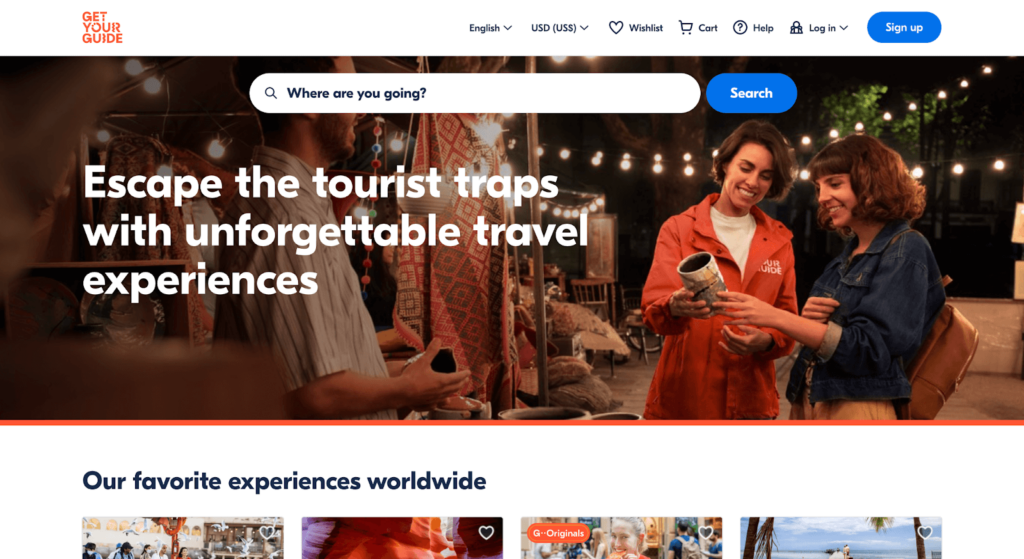
GetYourGuide launched in 2009 as an OTA specializing in travel activities and experiences. The platform sells tours, attraction tickets, city cards, cooking classes, transfers, multi-day tours, and special travel items like Wi-Fi sticks or experiences like wearing traditional costumes. The platform today has over 60,000 bookable activities.
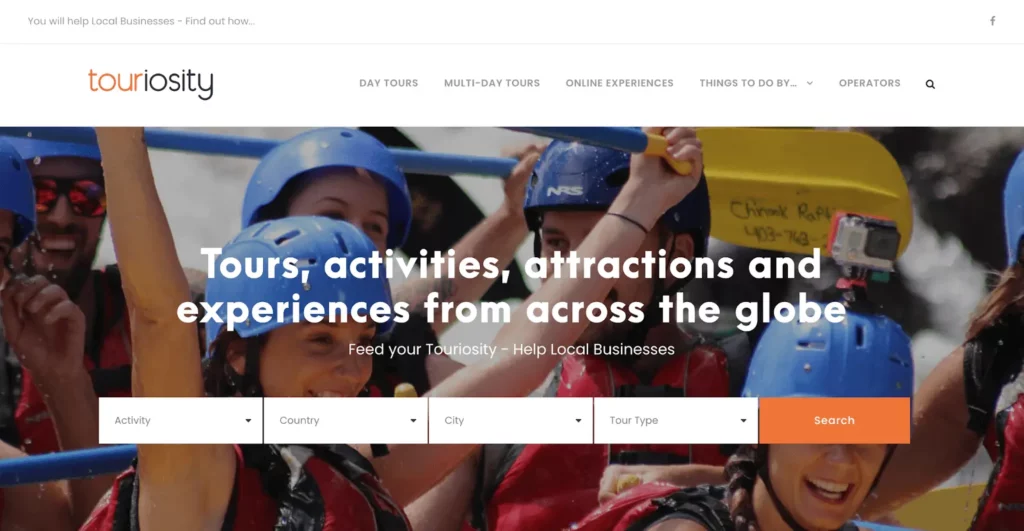
Touriosity is a Scottish nonprofit that takes zero commission from suppliers. Instead, it charges an upfront fee to list your offerings on the platform. The idea is to help suppliers grow their direct bookings while complimenting their own digital marketing efforts, according to the platform. To join, tour and attraction operators who want to join the project must have their business rated at least 4 stars on TripAdvisor, Google, and Facebook, and also register on the website.
Tripadvisor purchased Viator in 2014 to offer its users an easy way to book tours and activities. Today, Viator is one of the leading OTAs in the tours and attractions space, with more than 140,000 bookable activities. The website receives over 450 million unique monthly visitors through Tripadvisor’s expansive distribution network.
Klook is a travel experience booking platform based in Hong Kong. The website and app are popular with solo and independent travelers making their way through Mainland China, Hong Kong, Taiwan, Korea, and Southeast Asia. The OTA now has a growing audience in parts of Europe and the U.S., too.
Musement allows travelers to book local tours and attractions, including temporary, exclusive, hidden gem, and free activities. The company was founded in Milan in 2013 and has since expanded to 1,000 destinations in 80 countries.
Expedia is mostly known as a booking engine for hotels and flights, but it also sells tours and activities. The Expedia website has a “things to do” section where travelers can discover local experiences at their destination of choice. The Expedia Group owns several OTAs, including Expedia.com, Vrbo, Hotels.com, Hotwire.com, Orbitz, Travelocity, Trivago, and CarRentals.com.
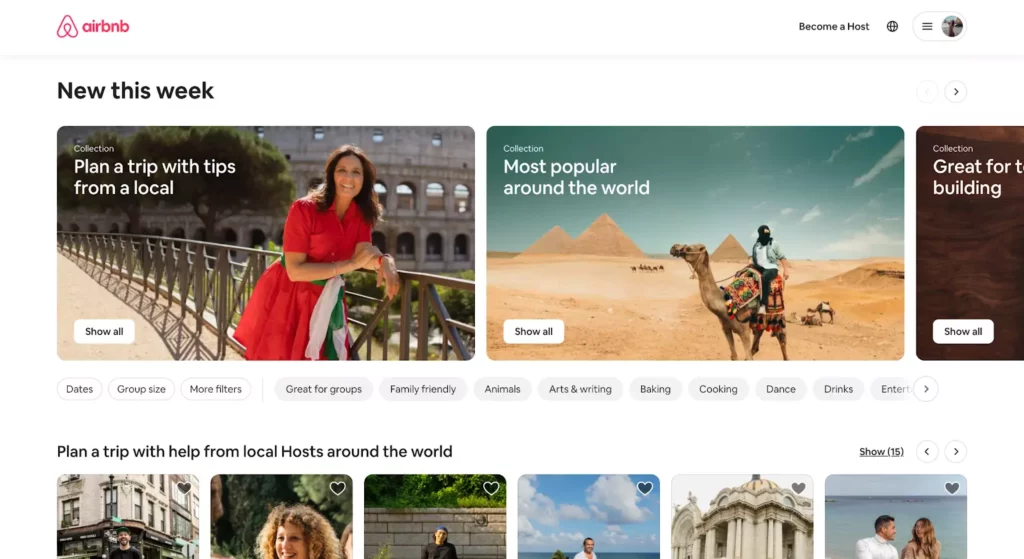
Airbnb is the leading marketplace for home-sharing and vacation rentals. The Airbnb website welcomes over 75 million website visitors every month. Many of these travelers are booking not only stays but also experiences. In 2016, Airbnb jumped into the tours and activities market with its signature tour brand called “Airbnb Experiences,” which included immersive tours and activities led by local hosts. The company also launched a slew of virtual experiences in response to the pandemic in 2020.
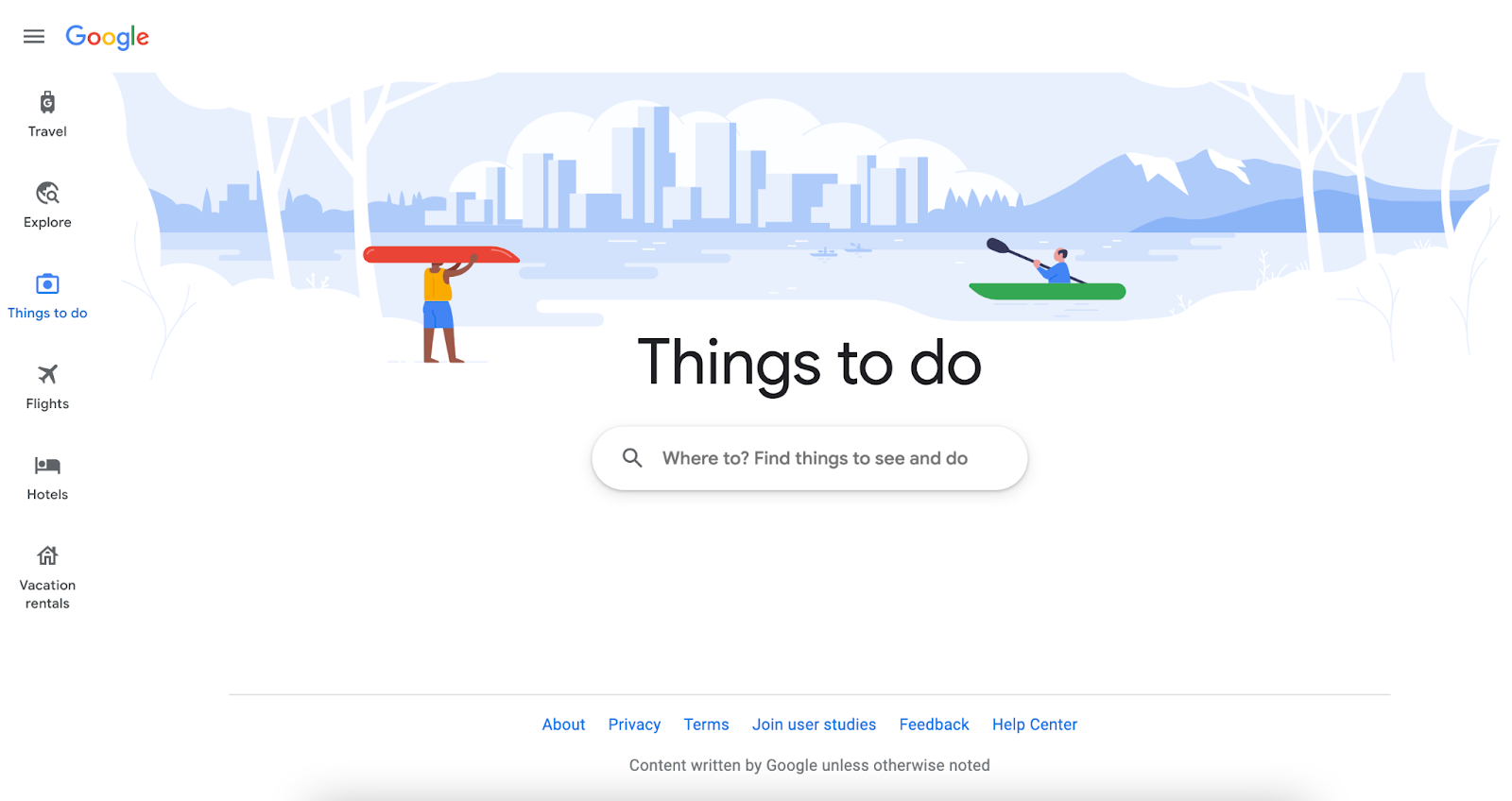
Google Things to do is a search experience that connects travelers to attractions, tours, and activities through their Google searches. When users search for a specific attraction, point of interest, or activity, they’ll be shown general information as well as booking links. They can book directly on the operator’s website or the various OTAs that sell the experience.
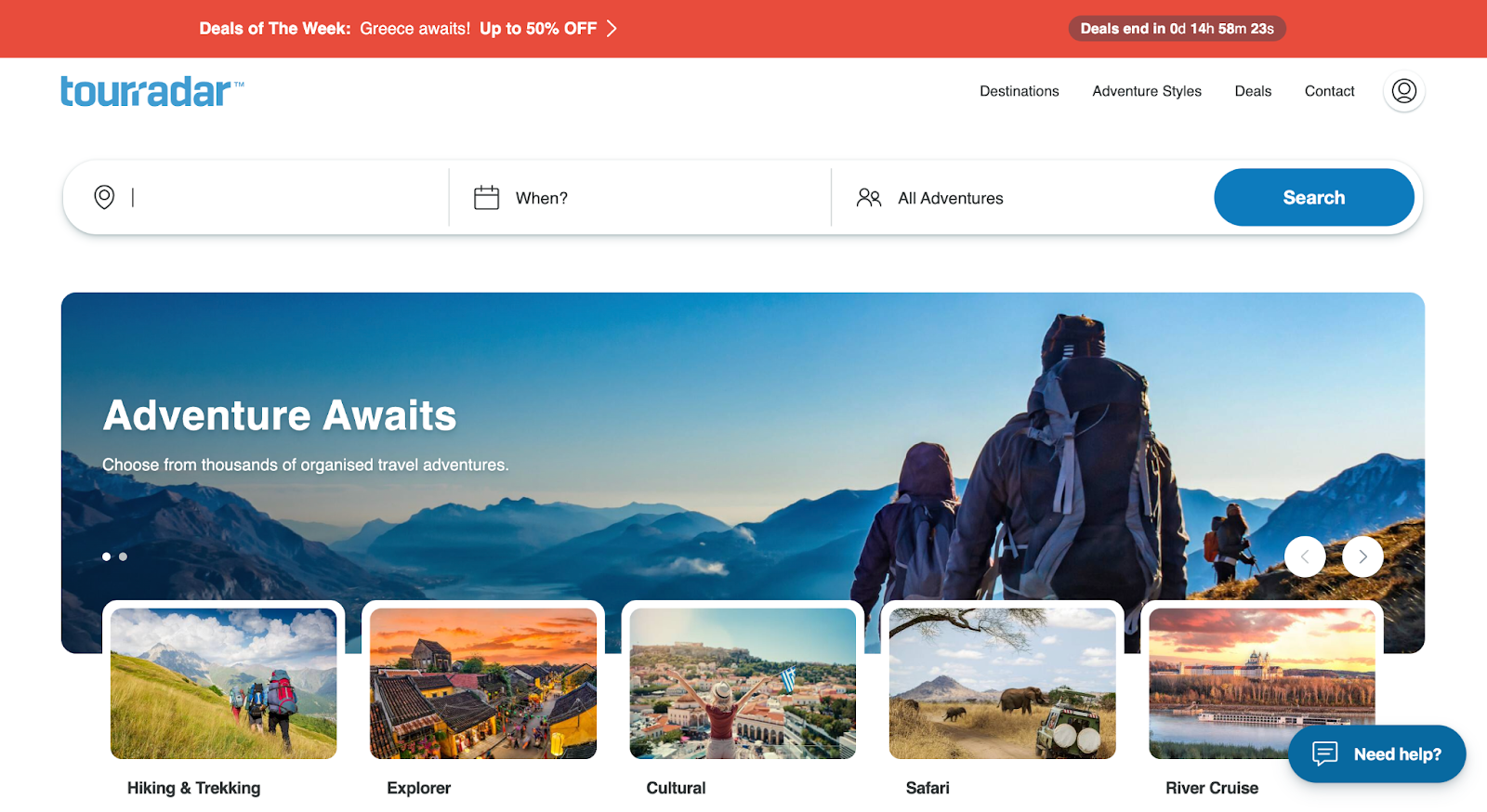
TourRadar is an OTA that focuses specifically on multi-day tours. The platform offers more than 50,000 tours in 160 countries around the world. TourRadar was founded in 2010 as one of the first OTAs to offer private and group tours that span multiple days.
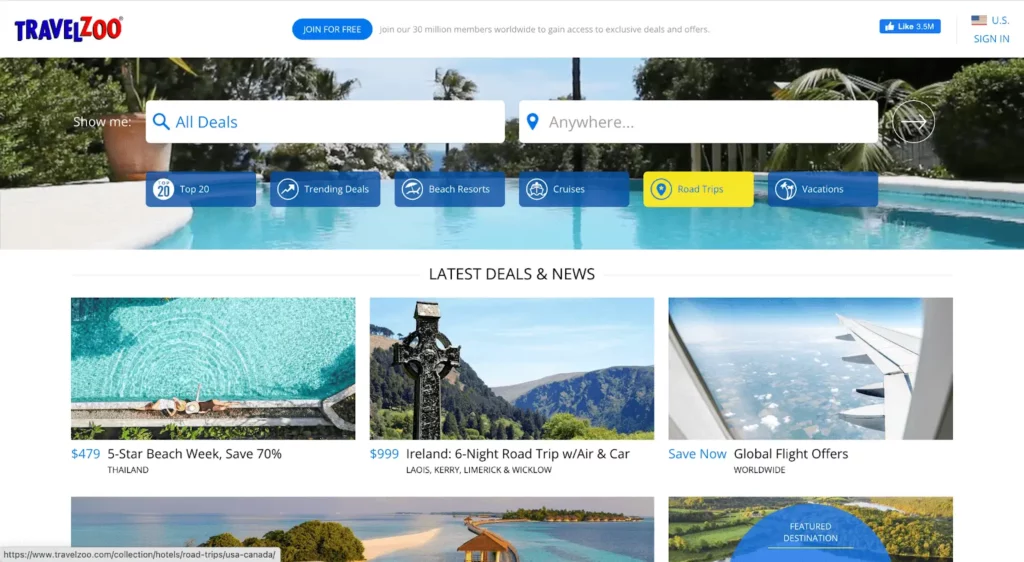
Travelzoo works with over 5,000 suppliers to offer travel, entertainment, and lifestyle experiences to over 6 million visitors every month. The platform also aggregates the best travel deals for hotels, flights, vacation packages, cruises.
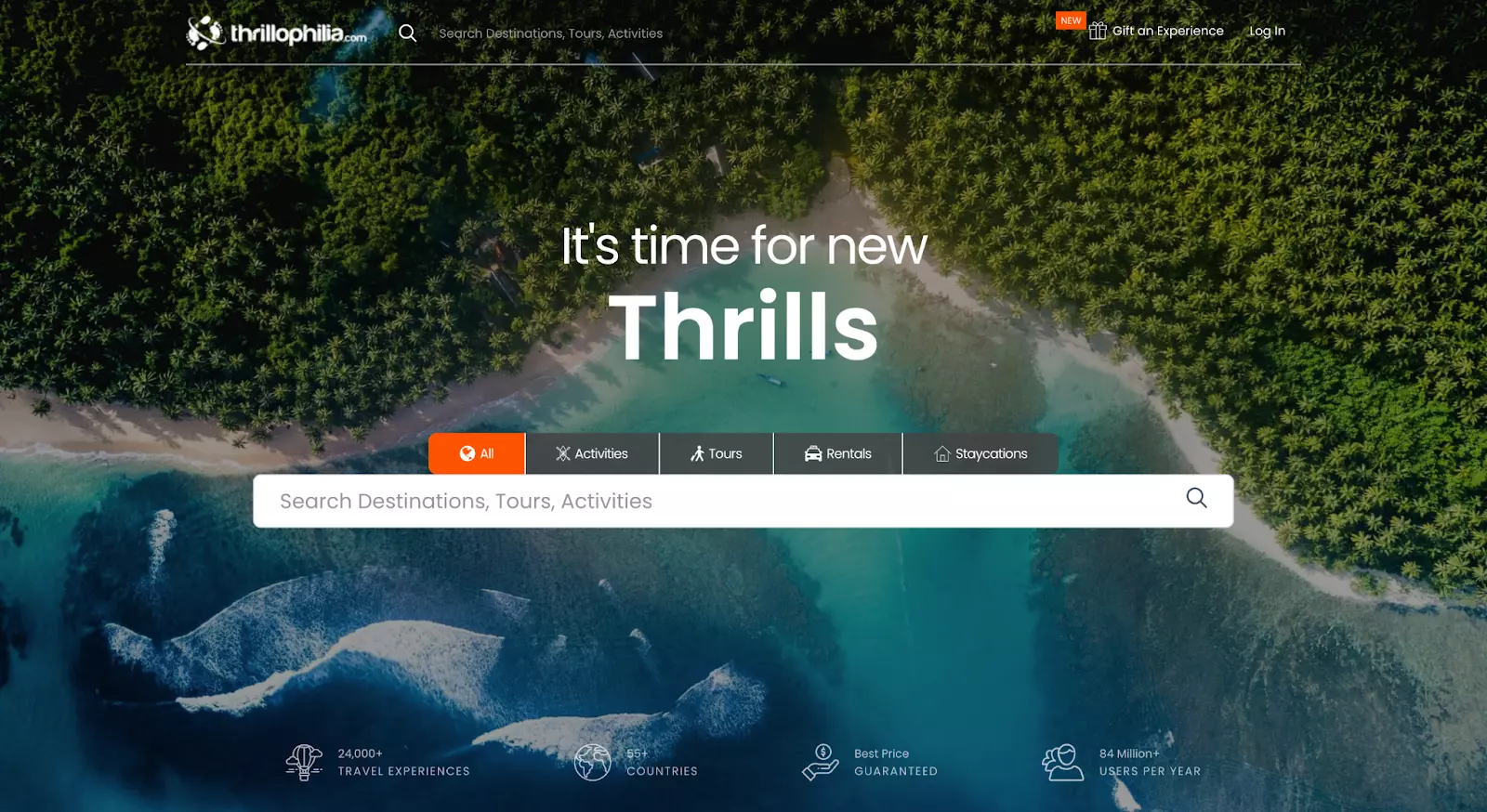
The Thrillophilia marketplace has over bookable 12,000 activities across 125 destinations. The company started with experiences in Bangalore, and today sells experiences in 15 Asian countries with Dubai, Thailand, Singapore, and Bali leading the charts after India. There are more than 5,000 suppliers selling tours and tickets on the platform.
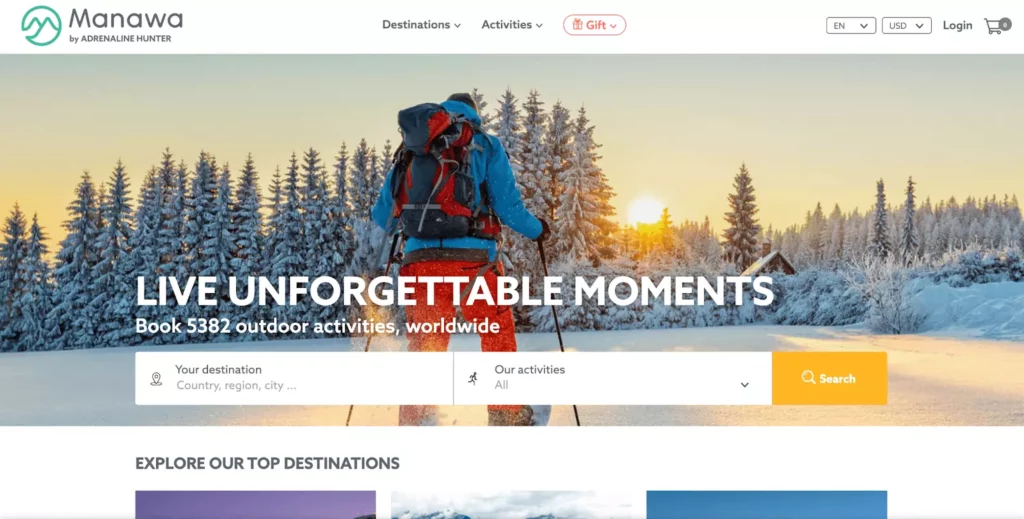
Manawa is a booking platform focused on outdoor activities like scuba diving, hiking, and helicopter tours. It currently has over 5,000 activities listed across 59 countries. Experiences are divided into six categories, including the “crazy” category where you’ll find crocodile diving, survival training, and other wildlife experiences.
Booking.com is the leading OTA in the hospitality industry. The company owns several big-name brands, including Booking.com, Priceline, Agoda, Rentalcars.com, KAYAK, and OpenTable. It also counts with a number of smaller OTAs like Rocketmiles, HotelsCombined, Cheapflights, and Momondo as part of its network.
Agoda is a popular OTA based in Singapore. The Agoda website offers hotels, vacation rentals, and flights in 39 different languages. It’s one of the many brands owned by Booking Holdings.
Trip.com is a full-service travel agency offering hotels, flights, cars, as well as tours and attraction tickets online. The website is owned by Trip.com Group, one of the largest OTAs in the world with over 400 million users worldwide. The Singapore-based company also owns Skyscanner.
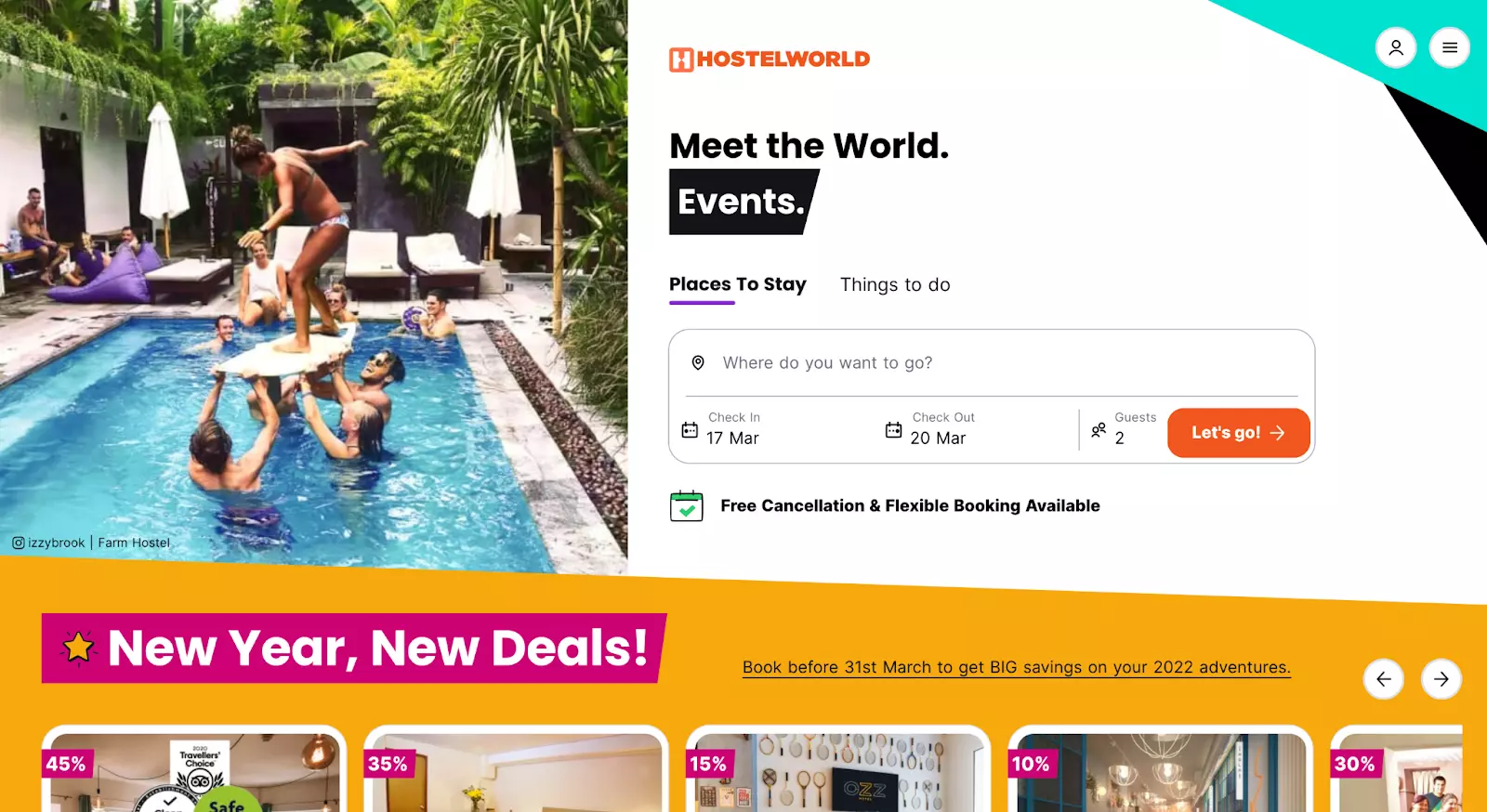
Hostelworld is the leasing OTA for hostel accommodations. The platform has more than 17,000 hostels listed across 179 countries. It has amassed over 13 million reviews since it was founded in 1999.
eDreams is a Barcelona, Spain-based OTA offering flights, hotels, car rentals, holiday packages, and travel insurance. The company currently operates in 40 countries, including Spain, Italy, France, Portugal, the UK, and the U.S. In 2011, eDreams became the first international OTA to expand into Turkey.
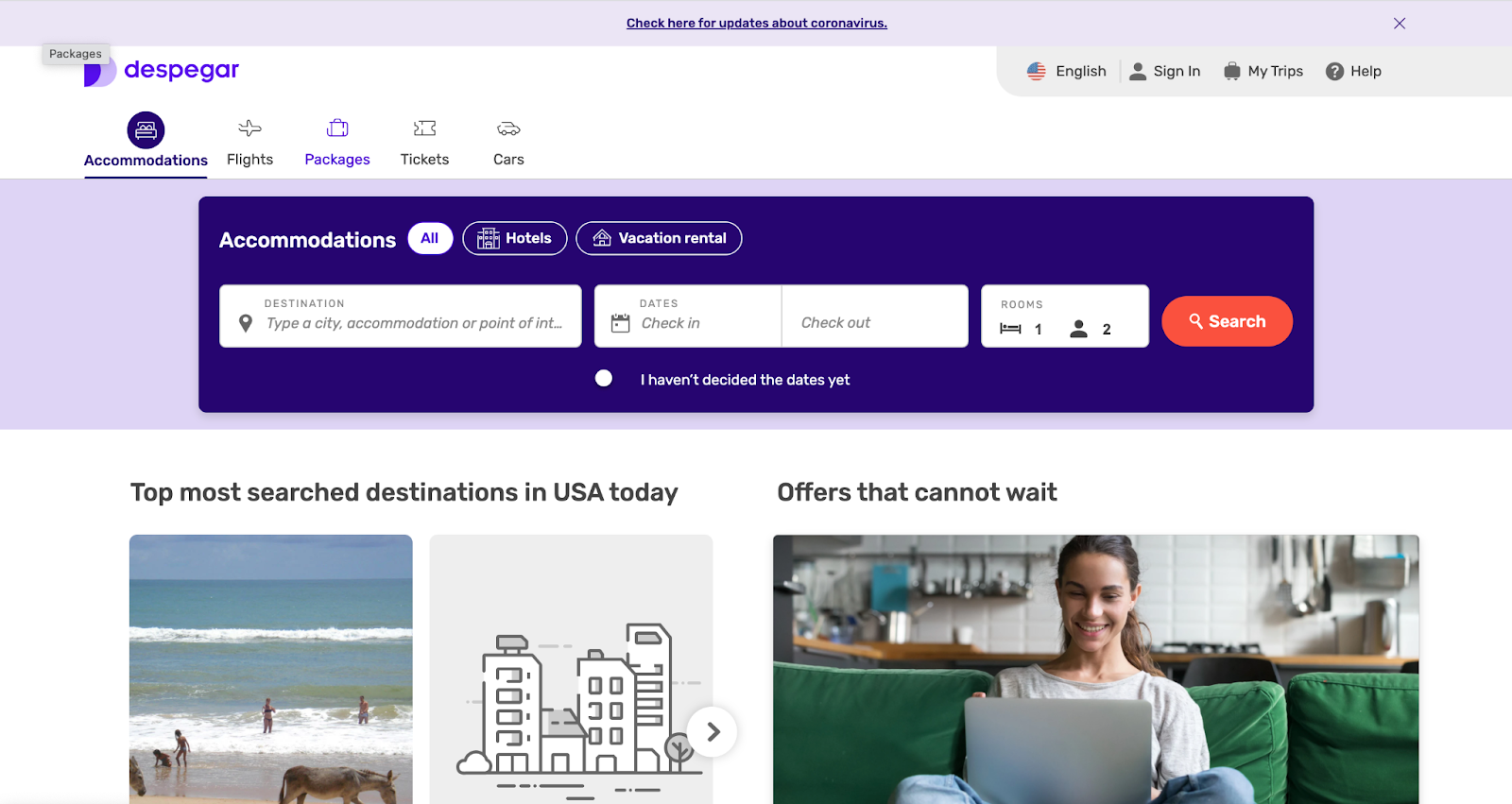
Despegar is the leading OTA in Latin America. The company owns two brands: The global brand Despegar and the Brazilian brand Decolar. The OTA offers airfare, hotel bookings, travel packages, and other travel products.
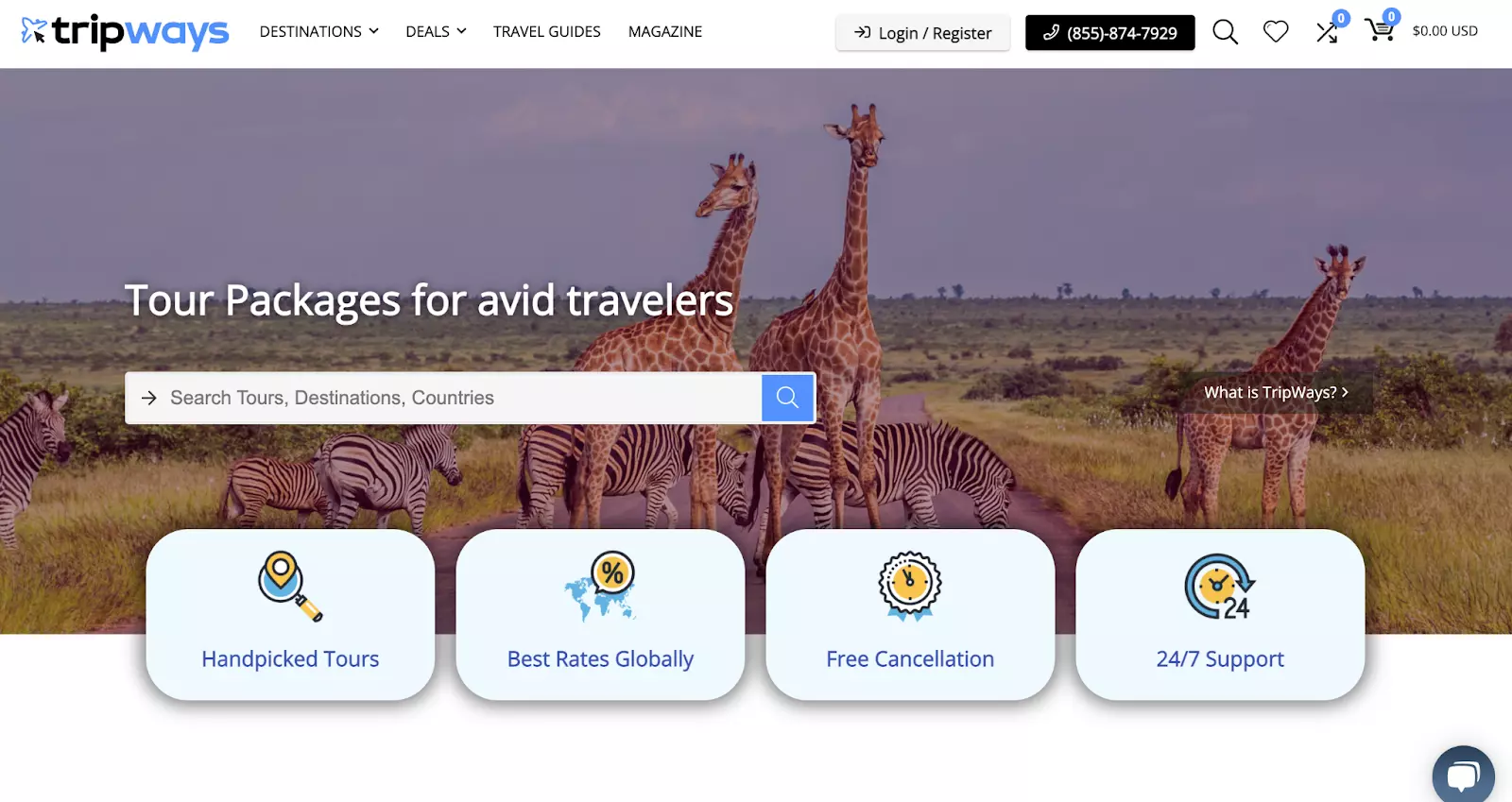
TripWays connects travelers to local tour companies and guides around the world. The OTA focuses on cheap flights, cheap hotels, tour packages, travel insurance policies, and visa services. It works with a limited number of tour operators for each destination, with a focus on multi-day and all-inclusive tours.
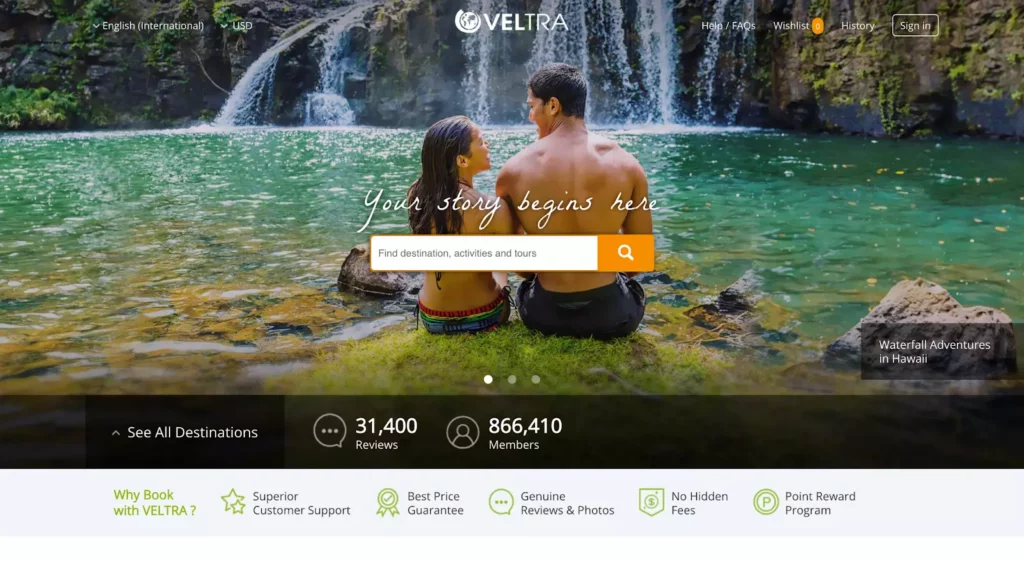
Veltra is Japan’s leading experience-focused OTA. It offers tours and activities across 150 countries. Founded in 1991, it was one of the first OTAs to offer bookable tours and activities online.
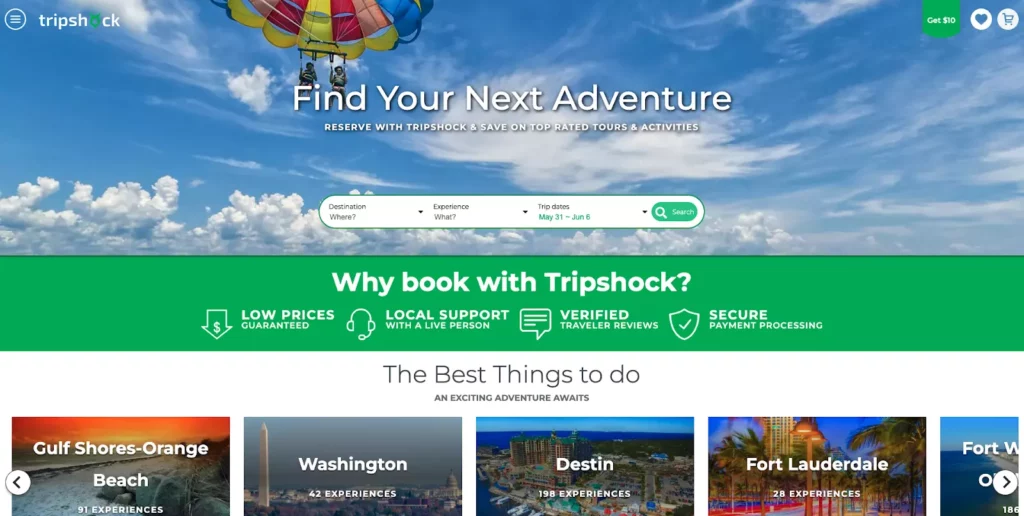
TripShock is a niche OTA focused on tourism excursions in and around the Gulf of Mexico and the Southeast. The Florida-based OTA offers activities in over 40 destinations spanning the region, including 1,000 tours, tourist attractions, and outdoor activities mostly suitable for individuals, couples, or families. The OTA was recently added to the many integratrations offered in Xola .
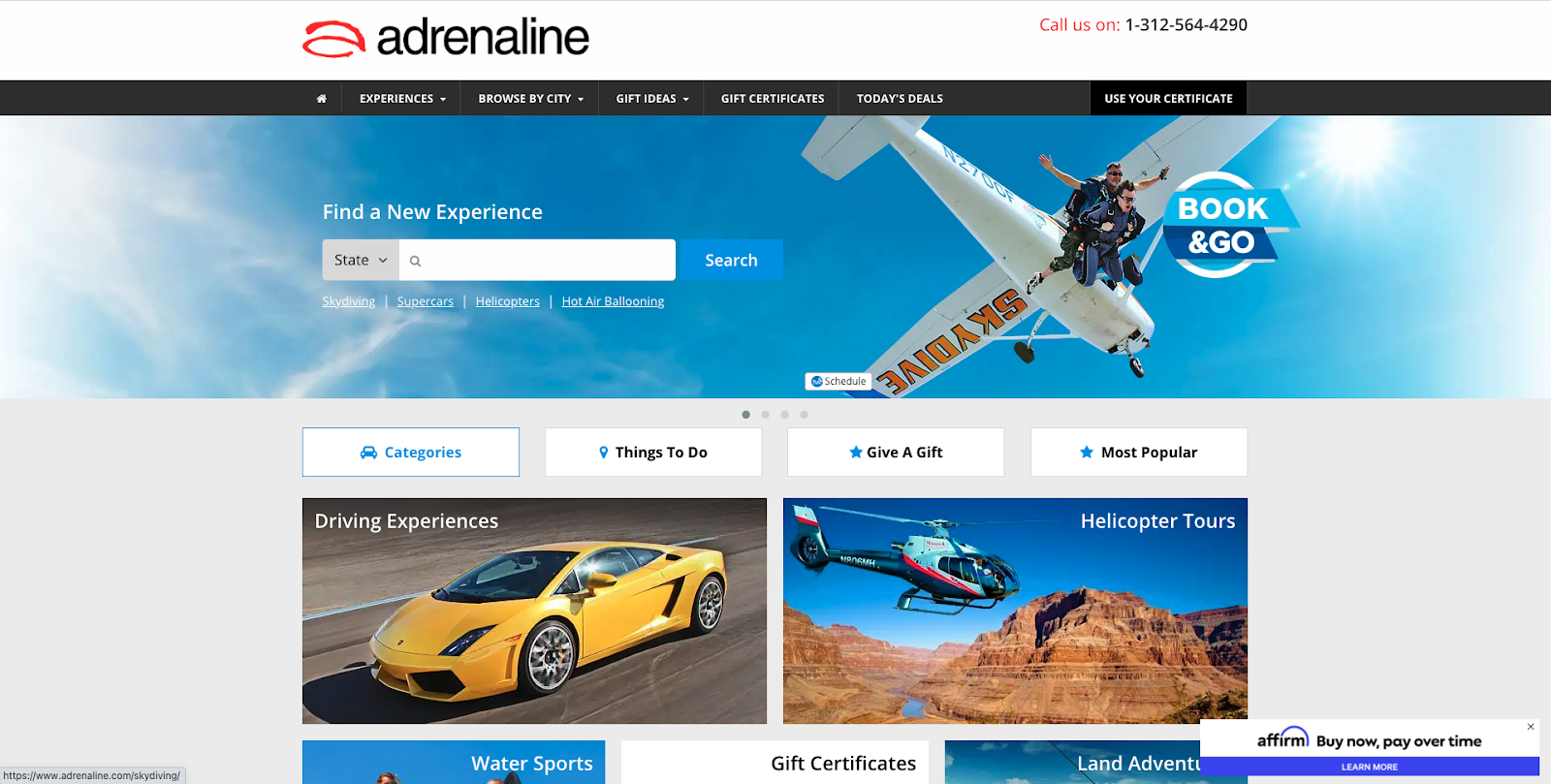
Adrenaline is an adventure-focused OTA offering 1,400 different travel excursions ranging from skydiving and helicopter tours to whitewarer rafting and zipline tours. It’s one of many OTAs that can be easily connected with Xola .
There are dozens of smaller OTAs on the market, but understanding how they work will help your business choose the best one.
It’s important to weigh the pros and cons of selling your experiences through an online marketplace — and try not to rely on them for all of your online bookings.
Writer Carla Vianna
Related Articles

A comprehensive guide to AI data security for tours and attractions
As the integration of Artificial Intelligence (AI) in travel becomes more prevalent, a new challenge arises: data security. Yet the

How to craft a brilliant tour itinerary that your guests will rave about
The best tour itineraries go beyond basic logistics and give guests a true sense of what to expect from their

How to use the LAST method to provide great customer service for tour guests
When it comes to customer service, there’s no one-size-fits-all kind of solution. Outstanding customer service is tailored to the specific
Get the latest news and resources.
For tours and attractions delivered straight to your inbox each week.
Transform your business now.

What is an OTA? Online Travel Agency Defined

In the ever-expanding realm of hospitality, the term ‘OTA’ is frequently tossed around. But what exactly does it mean, and why is it crucial for your vacation rental business?
Today, we’re demystifying the enigma of OTAs.
What is an OTA (Online Travel Agency)?
OTA stands for Online Travel Agency. These digital platforms, like Airbnb , Vrbo and Booking.com , act as intermediaries between hosts like you and travelers seeking accommodation.
Think of them as online marketplaces or booking platforms that connect your beautiful vacation rental property with a global , local or niche audience of potential guests.
Why OTAs Matter for Vacation Rental Hosts
OTAs play a pivotal role in the success of vacation rental businesses. They offer unparalleled visibility, putting your property in front of millions of travelers actively searching for unique and comfortable stays.
By listing your property on these platforms, you tap into a vast reservoir of potential guests, boosting your occupancy and revenue .
Benefits of Using OTAs
1. global exposure.
OTAs provide a worldwide platform, enabling your property to be discovered by a variety of traveler segments from every corner of the globe. This exposure can significantly boost your bookings .
2. Streamlined bookings for guests
OTAs offer user-friendly interfaces that simplify the booking process for guests. Travelers can easily view your property, check availability, assess your level of service, and secure their stay, enhancing their overall booking experience .
3. Credibility and trust
Being listed on reputable OTAs lends credibility to your vacation rental. Travelers often trust these platforms due to their – real or assumed — verification processes , leading to increased confidence in booking your property.
4. Payment security
Most OTAs handle payment transactions , ensuring a secure payment process for guests. This eliminates guest concerns about payment fraud and provides confidence to book.
How OTAs Make Money
OTAs operate on various business models, generally catering to both hosts and travelers.
Commission model
The most common approach, the commission-based model is where hosts list for free but pay a percentage of their booking amount to the OTA as a commission for every successful reservation. This incentivizes OTAs to promote your property as their earnings are directly linked to your bookings.
Many of the OTAs that use this approach also charge a commission from guests.
This is the model used by Airbnb, Vrbo, Booking.com, Expedia , etc.
Subscription model
In this model, the OTA charges hosts a fixed amount to list their properties on the platform, regardless of the number of bookings. This model is used by platforms such as Furnished Finder .
The platforms may or may not charge guests a booking fee.
Hybrid model
Some OTAs offer a hybrid model, combining aspects of both commission and subscription fees.
A few OTAs have their own distinctive model. For example, Hopper doesn’t charge hosts or guests a commission. Instead, it adds a dynamic markup to the rate provided by each property. Got2Go doesn't charge hosts either while guests pay a service fee per booking or an annual subscription.
Maximizing Your OTA Experience
To make the most of OTAs, optimize your property listings .
High-quality photos , detailed descriptions and competitive pricing can significantly enhance your visibility and attract more bookings . Moreover, prompt responses to guest inquiries and positive guest reviews can bolster your property's reputation and search rankings , leading to higher conversion .
Make sure you’re taking into account each platform’s unique requirements and preferences and optimize each listing accordingly.
OTAs vs Metasearch Engines
OTAs and metasearch engines serve distinct purposes in the online travel industry.
OTAs, as mentioned earlier, are platforms where hosts list their properties, and travelers can directly book accommodations. These platforms facilitate the entire booking process, including payment transactions and communication between hosts and guests .
Metasearch engines, like Google Travel and TripAdvisor , aggregate information from various OTAs and other sources, allowing travelers to compare prices and availability across different platforms. Metasearch engines redirect users to the respective OTA listings or direct booking websites to complete their reservations.
While both OTAs and metasearch engines contribute to a property's online visibility, OTAs offer a platform for booking directly while metasearch engines redirect to an OTA or direct booking listing.

Key Takeaway
Embracing OTAs is not a choice for most vacation rental property managers and hosts — it’s a necessity. By leveraging these platforms wisely and effectively, you open the door to a world of opportunities for your vacation rental business.
Ready to find out how Hostaway can transform your business?
Launched in 2015, Hostaway has helped thousands of vacation rental property managers regain their focus on growing their business. Hostaway takes pride in aligning itself with the needs of the fast evolving landscape and always provide reliable technology and great support. Sign up today!
Don't get stuck in a broken routine with poor software, manage your properties with Hostaway and experience a better business and life right away!

What is an OTA?
The definition of an online travel agency (OTA) is a website that sells travel-related products, including airline tickets, car rentals, cruises, experiences, accommodations and more.
Vacation rental managers would utilize OTAs that specialize in renting temporary housing to travelers. Some well-known OTAs in this category include Airbnb, Booking.com, TripAdvisor Rentals, HomeAway, Vrba, Expedia and FlipKey.
How Do Online Travel Agencies Work?
An OTA allows vendors in the travel industry like vacation rental owners and managers to list and advertise their products, usually free of charge.
The channels earn money by taking a commission on every sale. OTA rates and pricing vary between platforms, with commission ranging from approximately 3% to 25%.
How Do I List My Rentals on OTAs?
Though each OTA has its own specific guidelines, most will walk you through a simple sign-up process, during which you’ll relay details about your property, and then create a listing description , upload photos of your rental, check off the amenities you provide and set your prices.
How Does the Booking Process Work?
Once you’ve completed the process, you can publish your listings and wait for booking requests to come in, unless you’ve enabled guests to instantly book your properties without requiring your approval. In this case, you’ll receive direct reservations rather than requests.
Travelers will generally search for rentals based on date, location and the number of guests in their party, but they can also apply a variety of additional filters, like room type, amenities and facilities.
Initial communication with prospective guests will take place through the channel inbox. With some platforms, once a booking has been made, guests will be able to access the contact information you’ve provided and can then reach out to you personally, either via phone, email or SMS.
How Do I Get Paid for Bookings Made Through OTAs?
Payment policies vary across channels. While some channels process payments on your behalf and then release your cut of the revenue at a certain stage in the reservation, others may allow you to process the payments independently. Hosts can choose how they wish to be paid (i.e. via credit card or bank transfer).
How Do I Get Reviews?
After your guests check out, it is a good idea to kindly request that they review you on the original booking channel, as prospective guests often base their booking decisions on other guests’ reviews. In some cases, the channel will reach out on your behalf and ask guests to rate their experiences.
You will often be prompted to review your guests as well since guest reviews give hosts some indication of how trustworthy and responsible guests are before accepting their booking requests.
Read more about Vacation Rental Management Software
What to Include in Your OTA Listing Profile The Most Popular OTAs for Short-Term and Vacation Rentals How to List and Manage Rentals on Multiple OTAs
See Guesty in Action

New Research: 5 Things Hoteliers Need to Know About OTA Travelers
March 31st, 2021 at 10:00 AM EDT
New research shows that travelers that book trips via online travel agencies will play a significant role in hospitality’s recovery. Hoteliers that keep the evolving wants and needs of OTA travelers in mind will have an advantage as properties reimagine how they do business.
Travel providers continue to feel the effects of the Covid-19 pandemic, but many would agree that as widespread vaccine inoculations roll out, rapid testing sophisticates, and health passports are developed, there is a light at the end of the tunnel.
As hospitality leaders prepare for the beginnings of travel’s recovery, paying close attention to new behaviors and demands of travelers will be key. According to new research from Expedia Group done in partnership with global research firm BVA BDRC , travelers that book trips with online travel agency sites (OTAs) will be valuable to the industry’s rebound. Expedia Group’s economic impact study, which looks at OTA traveler behavior and spending patterns across the U.S., the UK, France, and Mexico through the lens of Covid-19, found that the contribution of OTA travelers — especially in the domestic category, where initial rebound will be strongest — should not be overlooked.
“Historically, OTAs have contributed a significant amount of value to the tourism industry and the overall economy — from the spend generated by OTA travelers, to the number of jobs generated — and we expect this to continue as the industry recovers from the impacts of the pandemic,” said Melissa Maher, senior vice president, Marketing and Industry Engagement, Expedia Group. “Because OTA customers tend to travel for leisure, and place value on overall trip experience, their spending patterns make them valuable guests as properties reopen their doors.”
Here, we look at five takeaways from the research that hoteliers should keep in mind about OTA travelers as properties reopen their doors.
1. OTA travelers spend on par, and sometimes more, on their accommodation and on amenity services than direct bookers.
There’s a common misperception throughout the hotel industry that direct bookers are more profitable for a hotel than OTA travelers. But Expedia Group found that, just prior to the pandemic, these travelers often spent more on property than direct hotel bookers.
“Just prior to the onset of the pandemic, OTA travelers spent more on-property — on things like hotel restaurants and spa services, for example — ultimately generating more revenue for the hotel. We attribute this to the typically longer length of stay for OTA bookers,” Maher said.
For example, in the U.S., domestic OTA travelers spend 16 percent more per trip and 5 percent more on property than those who book direct, and nearly the same amount on accommodations. They also stay an average of nearly 5 nights on a property, compared to just over 4 nights by direct bookers. They’re also more likely to book higher-end hotels, such as upper full service or luxury, than direct hotel bookers.
In the UK, domestic OTA travelers spend more than twice on hotel accommodation than direct bookers, as well as an average of one more night stay, at 4.4 nights versus. 3.5 nights. Domestic hotel guests who book via OTAs are also more likely to use several on-property paid-for services, including room service, spa service, the mini bar, and hotel dining offerings than direct hotel bookers.
Similarly, the research found that Mexico’s domestic OTA travelers also spend more on accommodation than direct bookers, and outspend direct bookers in categories such as hotel restaurant, mini bar, hotel bar, resort services, laundry services, spa, and childcare services.
Meanwhile, France’s domestic OTA travelers spend 8 percent more than direct bookers on accommodations, 5 percent more at on-property restaurants, and 26 percent more on hotel bar services.
2. OTA travelers generate more revenue for local communities than direct bookers.
Domestic OTA travelers will be vital to destinations as they rebuild their local tourism industries, Expedia Group’s research found. According to Maher, “OTA travelers are active travelers, meaning they shop, visit cultural attractions, and partake in local cuisine, among other activities, contributing more to local communities.” In the U.S., domestic OTA travelers spend 12 percent more on meals and drinks, 6 percent more on activities, and 27 percent more car rentals than direct hotel bookers, while Mexico’s domestic OTA travelers spend 20 percent more on meals and drinks, 24 percent more on activities, and 4 percent more on car rentals. In the UK and France, OTA travelers are more likely to visit cultural venues, historic sites and try local restaurants.
3. Travelers use OTAs for planning and research before they book.
Beyond booking, customers are also widely turning to OTAs in the planning and research phases before making a purchase. OTAs play a significant role when it comes to comparing rates across multiple travel products, from hotels to flights, to car rentals, and activities, as well as balancing features such as safety and room type.
Expedia Group found that in the U.S., the majority of both domestic and international travelers use OTAs to plan or research at least one aspect of their trip, at 61 percent and 74 percent, respectively. Additionally, 56 percent of domestic travelers and 71 percent of international travelers that use an OTA in the research and planning phases are likely to book via an OTA.
About half of domestic travelers and two-thirds of international travelers in France and the UK use OTAs to plan or research at least one aspect of their trip, and at least half of those who used an OTA for planning or researching ended up purchasing their travel from an OTA. The number was even higher for domestic travelers in Mexico, where 72 percent reported using OTAs to plan or research their trip.
4. Travelers Are Most Likely to Use OTAs to Find the Best Value
It’s common for consumers to prioritize value in periods of economic downturn, so it makes sense that in Expedia Group’s research, OTA travelers in the U.S., the UK, France, and Mexico turn to such platforms to find the best nightly rate.
Other top reasons travelers use OTAs include comparing properties in one location, seeking out the best room to meet their expectations on size, safety, and cancellation policies, buying bundled offers that combine multiple aspects of a trip, and finding promotions and earning reward points.
“Travelers have new preferences and motivations when booking accommodations, which isn’t surprising nor unexpected given our current Covid-19 environment,” Maher said. “Our research shows that OTAs outperform other distribution channels in providing options to meet a range of expectations, driving travelers to shop on online channels and compare hotel rooms and features to find the best options.”
5. How Travel Providers Can Successfully Engage With OTA Travelers
As travel starts to recover and OTA bookings begin to pick up, hoteliers must first understand who will travel first, and when and how they intend to book their stays. With more options and competition for travelers’ dollars, they are even more particular in their demands.
For example, on average, in the U.S., Mexico, and France, eight in 10 travelers said hotels in similar price ranges look the same online and that they must do more to stand out — and this crossed generational lines. “Clearly, hotels aren’t doing enough to make their value proposition unique and differentiated,” Maher said.
Hotel properties can stand out from their competitive sets by offering flexible cancellation policies, as well as incentives for bookings via mobile or discounts for longer bookings, as travelers look for extended stays to get away from home. Value-added incentives such as breakfast vouchers, free parking, or upgrades to premium rooms can help attract bookings as well.
And of course, cleanliness measures continue to be scrutinized by customers. “It has never been more critical to clearly communicate health and safety features so travelers feel confident in booking. We’ve had hundreds of thousands of properties add health and cleanliness information on Expedia.com, which includes enhanced cleaning measures, contactless check-in, social distancing, and other guest safety considerations,” Maher said.
Reputation also matters, with nearly 75 percent of U.S. and Mexican travelers reading reviews before booking a property. Travelers across all regions rate reviews about ‘room cleanliness’ and overall condition of the hotel as most influential. Reviews make an impact, especially to the heavily socially influenced American millennials and Gen Z, who showed slightly higher consideration for a property based on reviews.
Travelers are also viewing multiple photos before making a booking decision. More than half of Mexican travelers view 10 or more photos, and for millennials and Generation Z, it’s 15 or more. Meanwhile, 80 percent of French travelers and nearly 90 percent of UK travelers say photos of the hotel room are most essential to their decision.
As Maher explained, “While the travel industry continues to face a bumpy path to recovery, now more than ever, people are dreaming of their next trip. With this in mind, hotels should do their best to represent their property benefits and adjust their offerings to help encourage guests in the dreaming or research phase of their travel journey to book.”
This content was created collaboratively by Expedia Group and Skift’s branded content studio, SkiftX .
Have a confidential tip for Skift? Get in touch
Tags: france , hospitality , hotel marketing , leisure travelers , mexico , online travel agencies , otas , SkiftX Showcase: Hospitality , SkiftX Showcase: OTAs , united kingdom , united states
- Property Management System
- Channel Manager
- Booking Engine
- Marketplace
- Revenue Management
- Cloudbeds Payments
- Cloudbeds Amplify New!
- Whistle for Cloudbeds New!
- B&Bs and Inns
- Hotel Groups
- Vacation Rentals
- Channel Connections
- Ambassador Partner Program
- Cloudbeds Horizon
- Become a Partner
- Case Studies
- Resource Center
- Guides & Reports
- Calculators
- What to Expect
- Customer Success
- Knowledge Base
- Product Updates
- Cloudbeds University
- Government Compliance
- Company News
- Meet the Team
- Careers We're Hiring!
- Become an Ambassador
- Event Schedule
- Cloudbeds Amplify
- Whistle for Cloudbeds

A year in review: Top trends influencing the OTA industry
To ensure you’re able to strategize and build the best distribution mix for your property, it’s a good idea to keep up to date with the latest news and opportunities. Here, we share some of the major OTA trends from 2023 that we expect to impact the distribution landscape into 2024.
1. OTAs are back and stronger than ever
After a brief lull during the pandemic, OTAs are once again reporting strong growth and a remarkable pace of recovery. In 2022, OTA business represented almost one quarter or 22% of the total U.S. travel market .
OTA market share is dominated by two behemoths, Expedia Group and Booking Holdings, which collectively generated over $250 billion USD in travel bookings in the twelve months leading into Q1 2023.
For Booking Holdings, which owns and operates Priceline.com, KAYAK, and Agoda, as well as Booking.com and other travel sites, 2022 was its biggest year ever . The company generated almost 900 million room nights globally, a 6% increase over 2019. In 2023, the company generated $39.7 billion USD in gross bookings in the second quarter alone, the highest quarterly figure in the company’s history.
As for Expedia Group, which owns and operates Hotels.com, Vrbo, Travelocity, Hotwire.com, and Orbitz, among other travel sites, the numbers are lower but still formidable. In Q2 2023, the value of the company’s gross bookings was $19.2 billion USD, a record level for any second quarter in the company’s history.
Regional OTAs have been performing well, too. In Latin America, for example, Despegar reported $1.3 billion USD in gross bookings in the second quarter of 2023, a 16% increase over the same quarter the previous year. As for Trip.com, a leading OTA for Chinese travelers, our data shows a huge jump in revenue generated in 2023 across several countries, indicating the return of this segment to international travel.

“Many booking sites have fully recovered, or even grown, from pre-Covid levels,” Skift reported in July 2023. “Airbnb leads the online travel agency recovery, powered by the surge in demand for short-term rentals during the pandemic.” Skift also noted that, now that pandemic concerns have subsided, U.S. travelers have shifted away from direct hotel booking channels and returned to third-party booking sites.
2. Mobile bookings are a top priority for OTAs
To encourage travelers to book more hotel rooms from mobile devices, OTAs have been channeling their resources into promoting their mobile apps. The strategy seems to be working. Data from Booking.com shows that almost half of room nights (48 percent) were booked on its mobile app in the second quarter of this year, an all-time high.
Last year, Booking.com was the most downloaded OTA app in the world , with 80 million downloads. In second place was Airbnb, with 52 million downloads, followed by Expedia, with 27 million downloads. Also ranked within the top ten were Agoda, Vrbo, Skyscanner, Hotels.com, Trip.com, and Trivago.
Meanwhile, relative newcomer Hopper is taking the travel world by storm. Ranked in the sixth position on apptopia’s list, with 19.8 million downloads, the app-only OTA is especially popular among Gen Z travelers. And the big OTAs are taking notice. Earlier this year, Expedia ended its supply relationship with Hopper, and in October, Hopper ended its hotel partnership with Booking Holdings, perhaps as a preemptive move.
3. Leisure travel is softening, but other segments are poised for growth
There are signs that leisure travel is slowing down, and the pent-up demand that has fueled travel since the pandemic may have run its course. Fortunately, group and corporate travel are primed to pick up the slack.
“With less chance to bump into coworkers in the office, companies are focused on retaining their culture with more team trips and conferences,” says Booking.com .
Lodging operators who wish to take advantage of the upswing in corporate travel need to be active on the channels where business travelers go to book rooms. And that includes the GDS and OTAs.
“[Hotels] need to widen OTA distribution into a question of third-party distribution,” said Matt Varabkanich, Sr. Research Analyst at Cleveland Research, during Cloudbeds’ 2023 Passport User Conference in October . “I would break it down into four buckets: global OTAs like Booking.com, Expedia, Hotels.com, and Airbnb; regional direct-to-consumer OTAs like Agoda, Traveloka, Makemytrip, and Vrbo; wholesale B2B distribution; and closed user groups.
“Closed user groups is where we’re seeing the most emergence of new channels. In North America, that takes shape through the form of banks, credit card companies, retailers, or phone service providers creating travel portals that their customers can exclusively book through, a lot of times supplied by the OTAs, but we’re seeing an emergence of that taking place more here in North America and Asia Pacific. My guess is that would be more skewed towards super apps.”
Other expected growth drivers include international travel and events. In a survey of travel managers in the U.S. and Europe from Deloitte, more than half of respondents said they expect industry events to spur travel growth this year. The popularity of remote and hybrid work may act as an impetus, with meetings, conferences, and events providing an opportunity for coworkers, clients, and prospects to connect in person, Deloitte speculates.
4. OTAs and fintech companies unite forces
Across the travel industry, there has been a steady rise in investment in fintech products and services to boost revenue and enhance the traveler experience. Fintech, which stands for financial technology, refers to the new wave of finance services companies that employ innovative technology to compete with traditional financial methods and institutions.
Booking.com, which has traditionally operated on an agency model, has recently been shifting toward the merchant model , taking payments for hotel rooms from guests rather than requiring guests to pay the hotel directly.
Agoda has partnered with Sunrate, a global payment platform based in Singapore, and Airwallex, a fintech company that reduces fees charged for processing overseas transactions.
And the buy now, pay later (BNPL) craze has also taken root in OTAs. Airbnb has partnered with Klarna to allow customers to pay for bookings in four payments over a six-week period. Expedia has partnered with Affirm to allow guests to pay for flights and hotels in installments over three, six, or twelve months.
At the same time, financial institutions are partnering with OTAs to sell travel. For example, Nubank formed a partnership with Hopper to provide a comprehensive travel portal for its customers, and Citi launched Citi Travel in collaboration with Booking.com and Rocket Travel to allow Citi ThankYou card members to access inventory on the bank’s website and app.
5. OTAs embrace a future of AI-powered travel planning
Another big shift in 2023 was the widespread adoption of ChatGPT, the generative chatbot built by OpenAI. More than one million users signed up to the service within just five days following the launch, and that number has since grown to over 100 million users.
OTAs have been quick to jump on the bandwagon. Trip.com was the first OTA to partner with ChatGPT, introducing TripGen in March, a ChatGPT-powered chatbot. Soon after, Expedia Group announced an Expedia plug-in for ChatGPT. The following month, Expedia released a ChatGPT-powered AI chatbot on its mobile app, allowing users to ask the chatbot for help and get trip ideas while planning travel.
Since then, KAYAK has also formed an integration with ChatGPT. And in June, Booking.com added conversational chat capabilities to its mobile app.
While the adoption of AI by OTAs has come rapidly, the usefulness of these tools has yet to be proven. Rathi Murthy, Chief Technology Officer for Expedia Group, said in March 2023 , “honestly, the travel industry as a whole has a lot of legacy technology, and it’s not super easy to move in and adopt some of this. But I do see players like us — players that have core technology in the background, large OTAs — start jumping in to experiment and try things out.”
Moving into 2024, OTAs will further develop these technologies to deliver more personalized experiences that will significantly impact how travelers research and book accommodations.
6. Loyalty and retention are also top priorities for OTAs
If there’s a downturn in the economy and inflation remains high, travelers are expected to take fewer trips and will be more price-sensitive when choosing destinations and hotels. This will make it more challenging for hotels to attract repeat guests and build guest loyalty .
To combat this challenge, OTAs have made significant efforts to secure traveler loyalty. Booking.com’s Genius loyalty program is wildly popular, with first-tier members receiving a 10% discount on accommodation at participating hotels – and even bigger discounts for higher tiers. Those discounts come at the expense of hotels in the form of lower rates and higher commissions.
Earlier this year, Expedia Group launched the One Key loyalty program, which consolidates its previous programs, allowing members to earn points and use rewards on Expedia, Hotels.com, and Vrbo. Already, the program has an estimated 168 million members worldwide. While Expedia claims the program will help hoteliers accelerate demand and attract high-value travelers across its brands, hotels can expect to carry some of the costs of the perks.
“Uber has expanded into rides and food delivery and travel services in the UK, and I imagine those super apps are looking into more ways to sell travel services,” said Varabkanich during Passport. “On the global OTA side, the biggest two have taken different avenues, with Booking Holdings on the consolidation side, having acquired wholesaler Getaroom and is currently battling the European Commission to buy the number two flight OTA in Europe.
“Whereas Expedia has put its eggs in the baskets of Hotels.com, Expedia.com, and Vrbo and is pushing to drive more customer loyalty to the group of those brands. So, there’s different forms taking place of emergences vs. consolidation, something I think would be interesting to keep an eye on in terms of the emergence of new channels.”
7. OTAs are finding new ways to entice travelers
OTAs are also making it easier for travelers to discover new destinations and properties that might not otherwise be on the radar. In 2022, Airbnb introduced Categories, a new way for guests to discover unique places to stay. The site now lists over 60 categories based on the accommodation style, location, and proximity to activities, including tiny homes, luxe locations, and beachfront spots.
On Vrbo, visitors can visit the “Get inspired” section and browse categories such as family trips, the beach, pet-friendly accommodations, and places with swimming pools. Booking.com has a “pick a vibe” section with options like relax, outdoors, romance, city, beach, food, and skiing.
In May 2023, Airbnb also introduced Rooms, a product that takes the company back to its roots as a platform for finding shared accommodation. With Rooms, travelers can browse ‘Host Passports,’ an expanded profile with photos and fun facts to choose the host they’ll connect with best.
The Big Book of OTAs
- First name *
- Last name *
- Property Name *
- Property Type * Property type* Hotel Bed and Breakfast Hostel Apartment Groups Vacation Homes Alternative Accommodations
- How many listings do you have?
- How many Addresses does your business have?
- Language for your demo * English
- Increase revenue
- Delight guests
- Streamline operations
- Property Name
- Property Type Property type* Hotel Bed and Breakfast Hostel Apartment Groups Vacation Homes Alternative Accommodations
- Postal Code
- Language for your demo English Spanish Portuguese Franch Vietnamese Japanese Thai Italian
- Cloudbeds Hospitality Platform
- Cloudbeds Websites
- Ambassador Program
- Terms of Service
- Privacy Policy
- Data Security
- Cookie Policy
- Accessibility

What do online travel agents (OTAs) mean for hotel bookings?
What is the definition of OTA in the hospitality industry?
The hotel’s own website, global distribution systems (gds), wholesalers, the all-important hotel channel manager, are online travel agents (otas) good for the hotel industry, how much ota commission do hotels pay, we recommend the 12 best otas available on the internet, otas versus direct bookings: which is best, how important is the ota channel to hotels.
Online travel agents (OTAs) are one of the key distribution channels that hotels have at their disposal in order to market and sell their room nights.
This article investigates the relationship between hotels and OTAs and answers some key questions:
Are OTAs good for the hotel industry? How much OTA commission do hotels pay? How important is the OTA channel to hotels?
But before doing that, we are going to put OTAs into context and describe their position along with the other distribution channels that hotels use.
Hotels are advised to diversify their marketing strategy, and also strategically distribute their inventory on several OTAs and online marketplaces.
A healthy mix of OTA listings, metasearch advertising, social media promotions, email campaigns, travel host agency services, and partnerships with local businesses, is a good approach for hoteliers.
Let’s start at the beginning.
OTA equals O nline T ravel A gency.
They are online companies that allow users to book different travel-related services directly from the comfort of their homes via the Internet.
They are agents that outsource services and resell travel , hotels, vacation packages, etc organized by other companies.
According to the Statista website, analyzing and projecting 2023 data, the travel sector will practically double in size by 2030 .
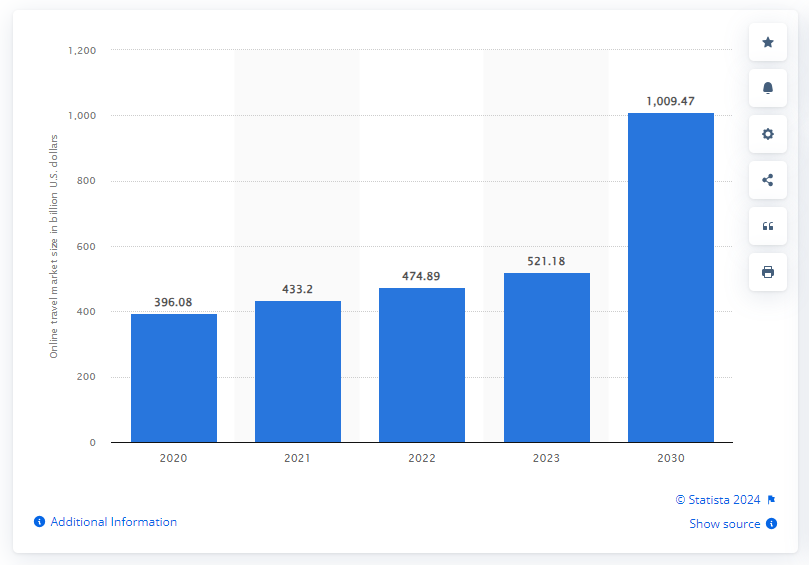
This projection has real support from this type of practice’s popularity over the last few years.
Above all, with the use of cell phones and online applications, which allow last-minute flight bookings at really affordable prices.
The OTAs have become an authentic solution for the user in an increasingly dynamic world.
In many cases, the primary channel for selling rooms is a hotel’s own website, or that of the parent brand. It is the only online distribution channel that allows hoteliers to sell directly to different types of travelers in one place. Sites need to load quickly and be optimized for smartphones and tablets. A high quality booking engine is essential to provide a seamless and smooth booking experience for guests. Hotelminder has a list of the ten best website booking engines of 2020.
Hoteliers need to practice search engine optimization (SEO) in order for their websites to appear in the top results on Google, Bing and other metasearch engines. On average, 53.3% of website traffic is organic, resulting from people asking questions and clicking through to sites providing the top-ranked answers.
A GDS is a consolidated reservation network, primarily used by travel agents, to reserve real-time flight, hotel and rental car inventory for their clients. Sabre, Amadeus, Travelport are well-known global distribution systems.
As a distribution channel, a GDS provides one connection to multiple travel agency systems and allows hoteliers to keep their listing updated across all networks through one interface. GDS create broad global exposure for hotel inventory and can help fill last-minute vacancies.
Generally, a GDS charges hoteliers a one-off setup cost and then take either a percentage or a fixed fee per booking. These costs differ from one GDS to another.
Also known as bed banks, wholesalers are third parties who source hotel room nights in bulk at heavily discounted rates and sell them, at a mark-up, to travel agents and OTAs. They are typically used by large independent hotels and chains to maximize occupancy and guarantee a certain occupancy rate. Wholesalers can help hotels reach international consumers they might not reach otherwise, although they do not interact directly with travelers.
A hotel channel manager is a vital piece of the hotel tech stack. It connects hotels to their online distribution channels – OTAs, GDS, wholesalers, and more – so they can be managed from one location in a fraction of the time.
Using a channel manager automates the exchange of rates, availability and reservations, often at near real-time speeds.
This enables hotels to make updates once and reproduce them across all of the channels they work with – saving time, increasing accuracy and reducing problems with overbooking and rate parity.
It also allows hotels to expand their distribution network by linking with online channels they may have previously not known about.
Chart 1 shows the position of the channel manager in the context of a hotel’s entire property management system.
The channel manager is positioned between the hotel’s chosen sales and marketing channels and its central reservation system (CSR).
Chart 1 The hotel channel manager within the wider property management system
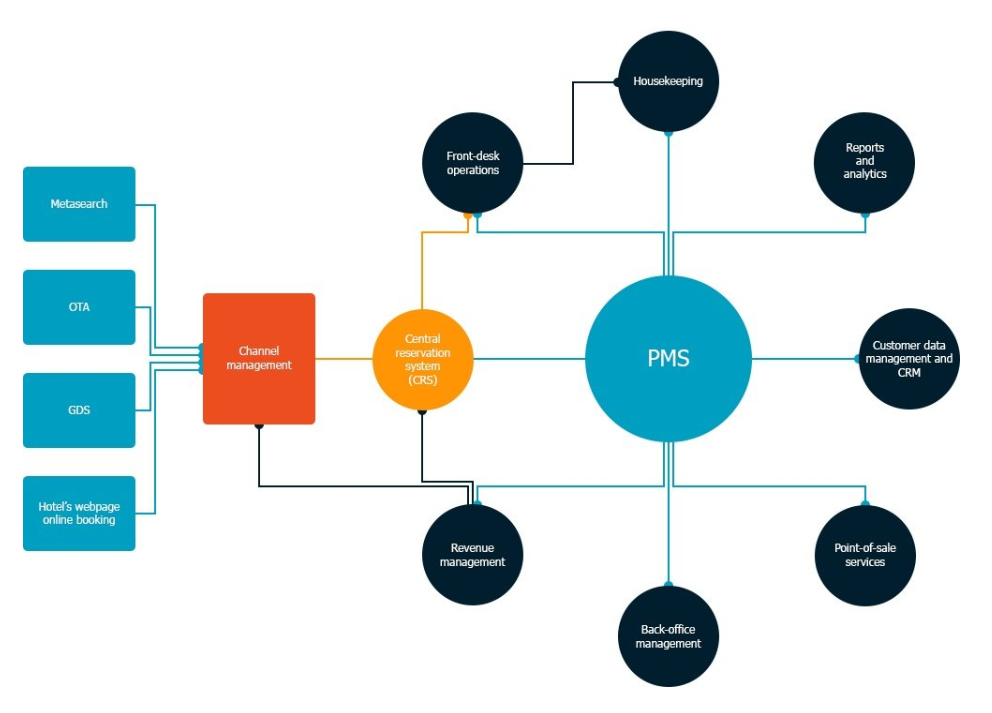
Source: Altexsoft
From the hotelier’s perspective, there are important advantages associated with using OTAs to sell rooms.
Market reach
OTAs offer access to an enormous marketplace of consumers actively shopping for travel. On average, more than 1.5 million room nights are reserved each day on Booking.com. Annually, more than 16 million room nights are booked via Expedia . So understanding what is a booking system , in a broader sense, is essential for success.
OTAs give hoteliers access to customers who would be difficult for them to reach directly, for instance, international travelers. OTAs translate hotel listings into several languages, something that would be expensive for most independent hoteliers to achieve.
OTAs act as the main point of contact for amending or cancelling bookings, freeing up hoteliers to focus on the guest experience in-house.
The Billboard Effect
For consumers, the attraction of OTAs is clear. If you have no loyalty to a particular hotel brand, but simply need to book accommodation in a specific city on a specific date, an OTA provides a range of hotels to compare instantly without having to open up several different websites. After consulting an OTA, many customers will go directly to their chosen hotel’s website and, if they find it user-friendly, will book direct. This is known as the Billboard Effect because the OTA is acting as an advertisement for the hotel.
OTAs can provide opportunities to participate in packages, e.g. bookings that include a flight and accommodation, or car hire and accommodation.
Expedia research shows that travelers who purchase packages book earlier and cancel less frequently than consumers who make standalone bookings. This results in higher rates for the hotel and reduces the need for last-minute discounting.
Pay as you go
When hoteliers form successful partnerships with OTAs they reduce their inventories of un-booked rooms and boost revenue, especially during off-peak periods. OTAs are often the best way of selling distressed inventory, such as that last-minute night in the middle of a busy week that is still free.
Hoteliers only pay OTAs when they actually fill rooms. Empty rooms mean no commission for the OTAs too, so both parties have a vested interest in selling as much as possible.
Market intelligence
OTAs gather huge amounts of market information and data. Hoteliers can take a lead from OTA data on customer profiles, booking habits and location trends to inform their own marketing and pricing strategies.
Many OTAs provide tools that allow hoteliers to identify and monitor their key competitors, thus benchmarking their own performance.
OTAs charge a fee per hotel booking which is typically a percentage of room revenue. Booking.com says its average global commission rate is 15%. The rate varies depending on the type of hotel and its location.
Research estimates that independent hotels pay Expedia commissions of 15-30% as opposed to large hotel brands that pay less, in the region of 10-15%.
Not all OTAs charge high commission. Although the OTA marketplace is dominated by Expedia and Booking Holdings, there are estimated to be some 400 OTAs in operation today.
Gomingo , a new London-based OTA, is currently charging zero commission to its partners for a limited time. The company pledges to only ever charge a maximum of 15% commission. Partners include some big hotel brands such as Novotel and Wyndham.
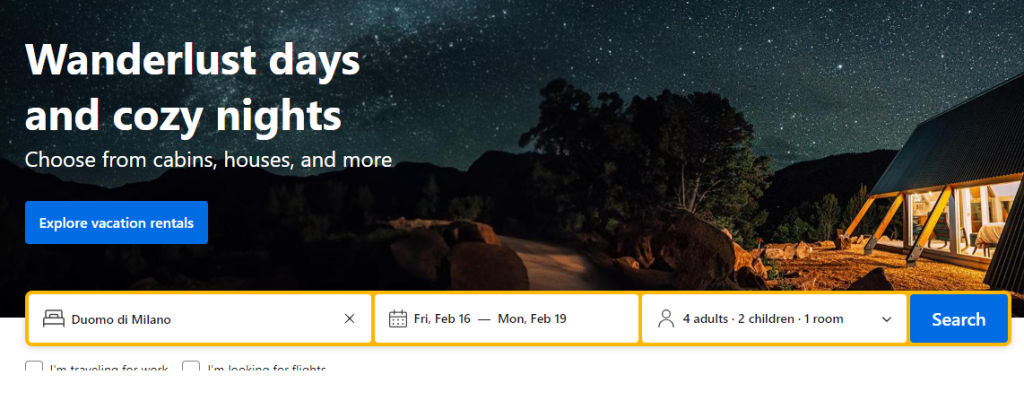
Booking is one of the leaders in the world of online booking.
This company, founded in Amsterdam in 1996, has not only a wide range of hotel accommodations on offer but also flights, cars and tourist attractions.
Thanks to its system of user ratings, an user can find out in seconds how the treatment and service in general has been from someone who has already had the experience.
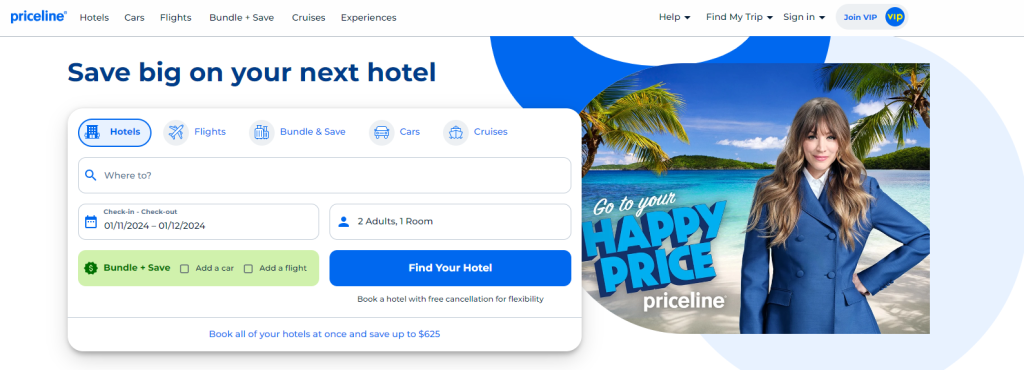
Priceline is mainly known for its “name your own price” style, which allows users to bid on a hotel room, car rental or travel ticket. If the offer is accepted, you can enjoy the service .
It was founded in 1997 and is part of the Booking Holdings group.

Agoda is a website founded in 2005 with a strong presence in Asia .
Over the years, its brand has grown to become a reference for all those western travelers who need to know the other side of the world.
Its extensive service includes accommodation in hotels or residences to a special transportation service from the airport to the rented place called “Airport Transfer” .
This can be very useful to be able to move to Asian countries that have different cultures and realities than those offered in Europe or the United States.
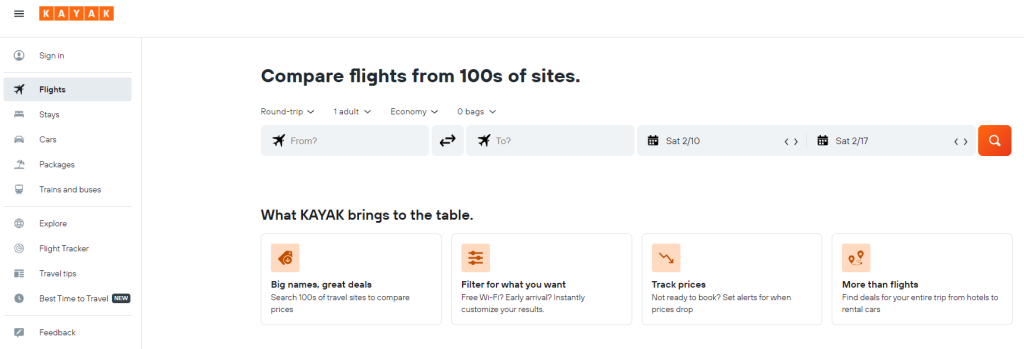
Kayak is a travel metasearch engine and one of the price comparators par excellence when looking for good prices for tickets to enjoy a vacation.
Its service includes “price alerts” that notify users about fare changes to help them get more benefits when traveling.
It also includes other interesting tools such as a trip planner, heat maps and price forecasts, making it an essential reference website.

Rentalcars is the most important reference for those travelers who want to enjoy a few days in Europe.
It was founded in 2004 in the United Kingdom and today has more than 60,000 locations in different parts of Europe and the world with a wide range of vehicles to choose from.
It has a very intuitive interface and the possibility to connect immediately to different car rental companies to have the best price in the market for the selected days.

Expedia is one of the pillars of the world of OTAs .
A key player in the travel industry, it was founded in 1996 and is today one of the major references in the United States.
Its services include everything from hotel reservations, flights and car rentals to the possibility of hiring a complete vacation package .
One of its key features is its rewards system , which allows users to accumulate points and then exchange them for exclusive benefits.

Hote ls have become a reference thanks to their long history and extensive catalog of services and locations.
Founded in 1991, today it has offers in more than 200 countries around the world.
Its main feature is its loyalty program, which offers travelers one free night for every ten nights booked .
Undoubtedly, an excellent opportunity for those who are frequent travelers.
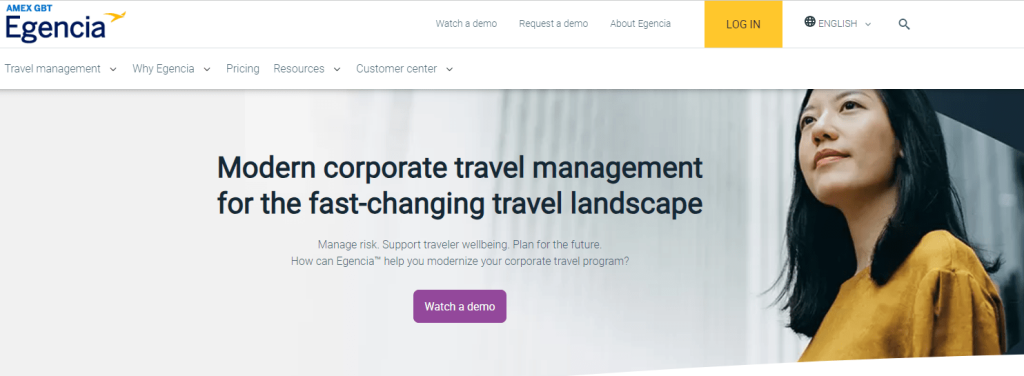
Unlike other OTAs, oriented to the general public, Egencia is characterized by its service to companies and business travelers .
It offers comprehensive solutions for the corporate sector combining technology with personalized attention.
In addition, as part of its service, it offers tools with expense reports , travel policy management and tracking of each of those compliances.
All this is to optimize corporate travel expenses offering companies a solution to this specific need.
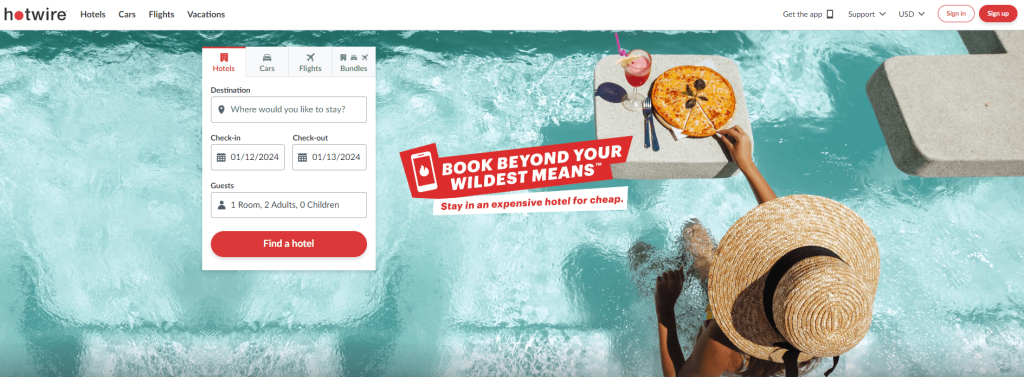
Referring to its name, Hotwire specializes for those travelers looking for “last minute” deals .
These are exceptionally low rates on hotel, flight and accommodation bookings.
The closer you get to the travel date, the greater the offer .
In addition, its section “Hot Rate” offers very important discounts especially in hotels and car rentals.

This allows users to access high-quality sites at really low prices.
Classic Vacations
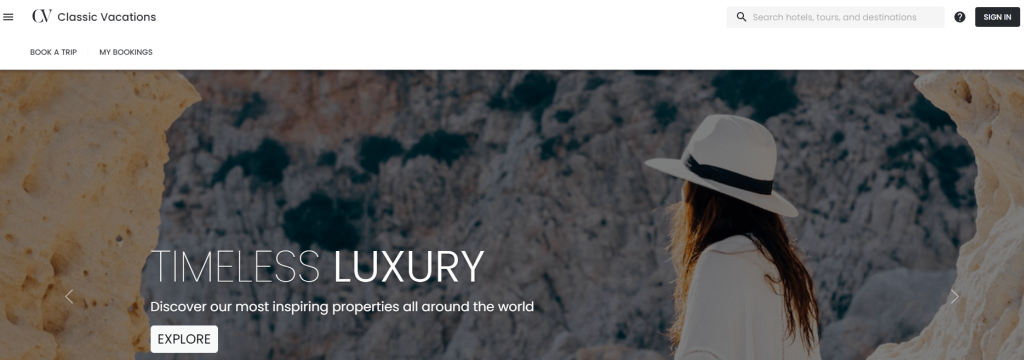
Part of the Expedia Group, Classic Vacations focuses on those travelers who want to live a personalized and tailor-made luxury experience .
Its goal is to provide the user with an exclusive vacation , which is why its catalog offers stay in high-end resorts, private villas and fully customized tours.
In addition, it has unique assistance and specialized personnel in the sector so each experience is unique.
Expedia Cruises
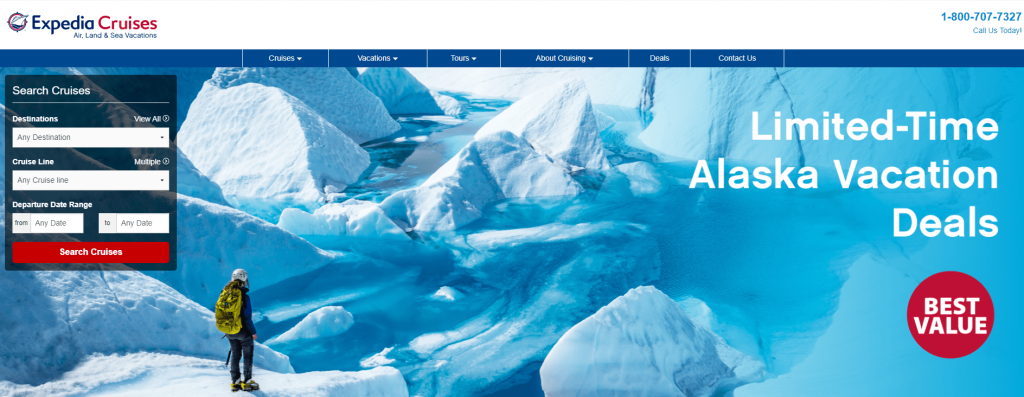
Expedia Cruises is focused on the booking of cruises to satisfy the demand of those who dream of a different vacation from the maritime world.
The interesting thing about this excellent portal is its cruise comparator , in which the user will be able to set his filters to find the cruise that best suits his needs.

Opodo is a company founded in 2001 and with a very special feature which is the possibility of establishing travel itineraries through the combination of flights with different airlines .
This functionality and unique feature offer the user flexibility and savings making it a very attractive option.
OTA commission levels have caused heated debate in the hotel sector for several years.
In fact, as a consequence of the “direct booking wars,” an entirely new wave of digital marketing suppliers has sprung up.
Companies like Cloudbeds , Avvio and HotelREZ offer services to help hotels receive a greater proportion of direct bookings through their own websites, thus cutting down on their sales expenses.
However, the ”OTA versus direct booking” debate has now moved on. Most hoteliers understand that OTAs are here to stay and that they need a mix of direct and OTA bookings.
In fact, although hoteliers have been critical of high OTA commission rates, the real costs of direct booking need to be considered too.
These costs include website and booking engine maintenance, the time spent on search engine optimization, newsletter and email marketing, advertising, and so on.
So the total costs of direct bookings versus OTA commission need to be accurately compared.
Having done so, many independent hotels and accommodation providers have come to the conclusion that the most cost-effective business model for them is to have a simple website (sometimes even without a booking engine) and use OTAs for the majority of their bookings.
In a Hotel Analyst report, Macy Marvel argues that the attention paid to the OTAs is out of proportion to their actual importance as a distribution channel.
She notes that still roughly half of hotel bookings worldwide arrive via conventional channels e.g. walk-ins, telephone, fax, email and only about 20% of the hotel stock in China and India, for instance, is bookable through online channels.
The major hotel brands, often the loudest critics of online travel agencies, actually rely on OTAs for about a quarter to a third of their online bookings, or just 10 to 15% of total bookings, writes Marvel.
The situation is radically different for independent hotels, however, especially those outside major cities, who might take as much as 70% of their bookings through OTAs .
Subscribe to our newsletter
Yay you are now subscribed to our newsletter.

Ben Walker has 18 years of experience in the hotel and travel sectors. He has worked as PR & communications manager for TRI Hospitality Consulting London, the creators of HotStats, the hotel market benchmarking, financial analysis, and performance reporting solution. He has also been the business editor of The Caterer, and communications manager and editor for the international professional body, the Institute of Hospitality.
Mize is the leading hotel booking optimization solution in the world. With over 170 partners using our fintech products, Mize creates new extra profit for the hotel booking industry using its fully automated proprietary technology and has generated hundreds of millions of dollars in revenue across its suite of products for its partners. Mize was founded in 2016 with its headquarters in Tel Aviv and offices worldwide.
Related Posts
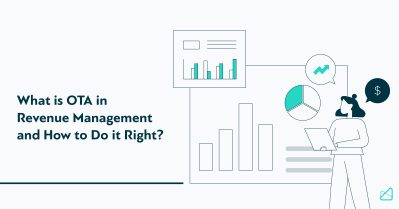
What is OTA in Revenue Management and how to do it right?
11 min. A hotel revenue management strategy is usually a comprehensive strategy encompassing various analytics and demand forecasting tasks to custom tailor pricing and distribution strategies. While there are many independent hotels, most hotels list their accommodations through OTAs. But where does that leave OTAs? The OTA market is quite dynamic and has some serious […]
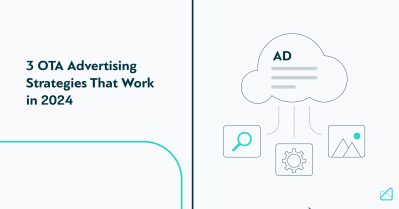
5 OTA Advertising Strategies That Work
8 min. Online travel agencies or simply OTAs have plenty of opportunities to market their offer to the target customers. Some strategies focus more on generating exposure, while others generate more leads and increase conversion rates. There are also more and less efficient advertising strategies. One common question that continues to trouble online travel agents […]
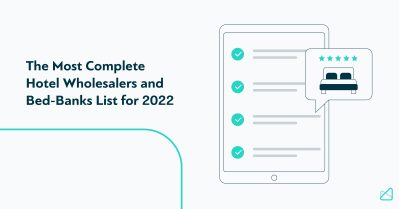
The Most Complete Hotel Wholesalers and Bed-Banks List
28 min. Finding a professional and reliable hotel wholesaler is not an easy task. There are dozens of hotel wholesalers to choose from on the current market. However, they are not all the same. Some are better than others in terms of the commercial conditions they offer, the variety of hotels they have access to, […]

Three key developments in the U.S. OTA market
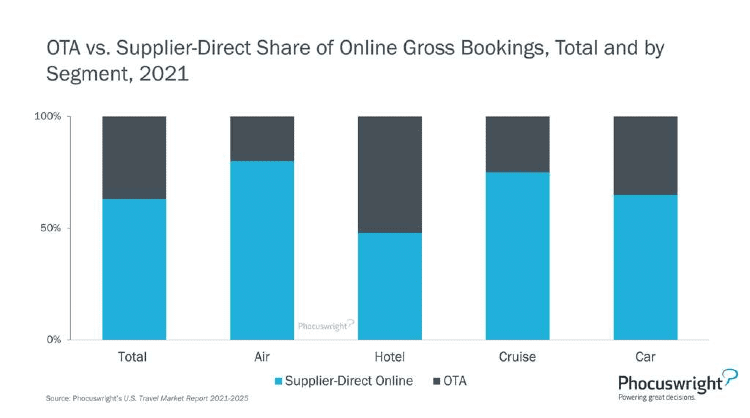
OTAs showed welcome recovery in 2021, buoyed by continued strength in domestic travel. After ending 2020 down 58%, U.S. OTA bookings nearly doubled despite the ups and downs of another pandemic year. According to Phocuswright’s latest travel research report on the segment U.S. Online Travel Agency Market Report 2021-2025 , OTAs delivered $65.2 billion in gross bookings in 2021, reaching 82% of pre-pandemic levels (2019).
Three key developments in the U.S. OTA market:
Full-service stands alone no more
Expedia has long offered a near-full spectrum of travel products via its flagship Expedia.com site, allowing customers to book multiple products for a trip, while its U.S. competitors have heavily skewed toward one product line.
Booking.com and HotelTonight have been rooted in accommodations, Hopper and CheapOair in flights. However, Booking.com and Hopper both made great strides in expanding into full-service OTAs, putting new pressure on Expedia.

Money talks: sales, acquisitions and investments
2021 was a year for OTAs to examine portfolios and either slim down or supplement their offerings. For Expedia Group, the focus was simplifying business to operate more efficiently as a family of brands, and investing in businesses where they are best positioned to win.
Conversely, Booking Holdings opened its wallet wide, spending more than $3 billion on acquisitions and investments in 2021.
Hopper, which plays on a much smaller scale compared to Expedia and Booking but has big ambitions, also joined in the acquisition game, while raising $345 million in 2021 between its March Series F and August Series G rounds.
Tours, activities & attractions: the remix
Not long ago, the tours, activities and attractions segment was dubbed the next big source of growthin the travel industry. The category flourished in 2018, and OTA giants, including Booking and Expedia, were vying to position themselves as leaders.
Since then, both OTAs have changed their approach to offering activities. Rather than sourcing all supply directly, Expedia and Booking have largely turned to partnerships with activities-focused travel companies. While changes had already been in play pre-pandemic, the OTAs have further enforced the partnership approach in 2021.
Hopper, in contrast, entered into the space with its PlacePass acquisition. PlacePass was most notable as the supply source of Marriott’s tours and activities booking platform, which Hopper will now power.
OTAs continue to regain share of the total online market during travel’s recovery in 2021. However, it’s important for travel companies to know that supplier websites maintained their majority stake in the U.S. online travel market with a 63% share of online gross bookings. This report helps companies understand how suppliers and OTAs compete, differentiate themselves and offer new value for travelers. Phocuswright’s U.S. Online Travel Agency Market Report 2021-2025 provides a comprehensive view of the U.S. OTA landscape, including detailed market sizing and projections, distribution trends, key developments and more.
For further intelligence for you and your entire company, subscribe to Phocuswright Open Access. This subscription puts the entire Phocuswright research library and powerful data visualization tools at your fingertips. There’s a reason executives around the world trust and reference Phocuswright research and data on a daily basis. See the benefits here .
Related Articles

Report highlights hotel investor attitudes and opportunities for revenue management technology
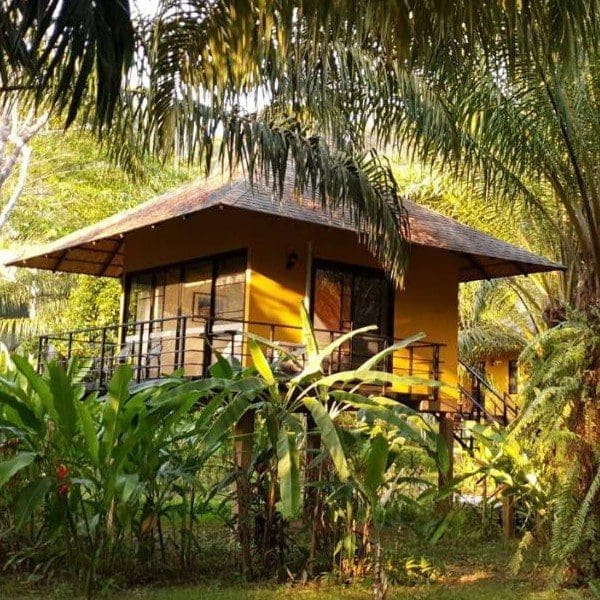
YAANA Ventures announces innovative research opportunity for Anurak Lodge

Customer feedback on hospitality experiences: 5 best practices

Sense of ‘professionalism’ linked to unethical behavior
Related courses.
You might also like:

How hotels are maximizing Groups business in 2024

From spreadsheets to AI: the new era of Revenue Management

Consumers booking wellness treatments on shorter lead time

Embedding sustainability into a hotel starts with leadership

Beyond survival: The need for sustainable change in UK hospitality

Join over 60,000 industry leaders.
Receive daily leadership insights and stay ahead of the competition.
Leading solution providers:
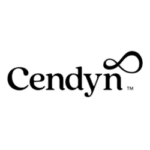
Maestro PMS
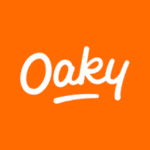
- Join Us for: ◆ Arival 360 | San Diego 2024, 30 Sep - 3 Oct 2024 ◆ Arival 360 | Valencia 2025, 28-30 Apr 2025 ◆
- The Power of Play “In My Travel Era” — Taylor Swift, Beyonce Usher in an Event Tourism Renaissance GetYourGuide Rolls Out Conversion Rates, Other Features to Operators With “GetYourGuide Unlocked” The Rapid Rise of the Private Tour Taker
- Distribution
- Operator Stories

ARIVAL 360 | SAN DIEGO
30 september – 3 october 2024.
Insider Pro Access Members save 20%
THE event of the year for solutions-focused in-destination experience creators and sellers
Save up to $740 with the Early Bird ticket
- Marketing with Google
- Culinary Experiences Guide
- Arival Booking System Guide
- How to Choose a Booking System | CHECKLISTS
- Search All >
- Insider Pro Access membership
- Insider Free membership
- Special Offers
- Arival ProShield Insurance

ARIVAL 360 | VALENCIA
28-30 april 2025.
THE event of the year for the European in-destination experiences industry
SAVE UP TO €990 as an Insider Pro Access Member
- 30 Sep - 3 Oct 2024 Arival 360 | San Diego 2024 28-30 April 2025 Arival 360 | Valencia 2025
- All Events >
- The Attractions Forum @ Arival 360 | Berlin 2024 Arival 360 | Berlin 2024 Insider Pro Meetup - Strategies to Scale Insider Pro Meetup - Operator Spotlight UKinbound Webinar | The US Consumer Insider Pro Meetup - Strategizing for Success
- Arival Spotlight Awards
- Arival TourReview Spotlight Awards
- Introducing Spotlight Awards
- TOURREVIEW SPOTLIGHT WINNERS ORLANDO 2023
- METHODOLOGY
- TOURREVIEW SPOTLIGHT AWARDS FAQS
- Arival Spotlight Winners
- Arival Spotlight Submissions
- Spotlight FAQ
- The Power of Events: How Sports and Performing Arts Drive Tourism The 2024 U.S. Tour Taker The 2024 Experiences Traveler Outlook Arival Guide to Channel Management: Strategy, Connectivity & Technology
- The Outdoor Adventure & Activities Traveler REPORT SERIES: The 2024 U.S. Experiences Traveler
- Employers Dashboard
- Job Board – Post A Job
- Search Our Talent Pool
- Job Seeker Dashboard
- Join Our Talent Pool
- Job Resources
- Tour Guides & Directors
- In-destination Specialty Career
- Marketing & PR
- Operations & Logistics
- Water & Theme Parks
- All Job Categories >
- Join Arival Insiders Free
- Subscriptions
- Group Subscriptions
- Members FAQ
The Role of OTAs in Tours, Activities & Attractions Distribution
There seems to be no end to the discussion, debate — and confusion — about the market share and role of online travel agencies in tours, activities and attractions. So we thought we’d clear things up

by Douglas Quinby | 20 June 2022
How important are online travel agencies in the global tours, activities and attractions market? It’s a question we see come up — and get debated — time and time again. There are also some commonly cited statistics, such as: “less than 10%,” but often these are pulled from some previous research report or article and without much context.
Arival has produced the majority of research on tours, activities and attractions over the past several years. We always try to provide that context to our statistics, but it can still get easily overlooked or misunderstood in short articles or social media threads.
Here are a few ways to look at it: tour operators, attractions and the OTAs themselves should view it in different ways.
OTA Market Share Is So Small!

Well, yes, and no.
The global tours, activities and attractions market was $254 billion in 2019. This represents the aggregate gross bookings of all day tours, activities, visitor attractions and experiences. The 2019 OTA share of that figure is less than 5%. The full detail of those numbers is available in the Arival report: The Experience Revolution — Size & Structure Of The Global Operator Landscape (this is a free report for Arival Pro Access members).
Less than 5% must mean that OTAs play a small role in sales and distribution for our industry, right? Not exactly. For many operators, that figure can be misleading.
30 September – 3 October 2024
Insider Pro Access Members Save 20%
THE event of the year for solutions-focused In-Destination Experience creators and sellers
That <5% figure represents the share of the entire experiences marketplace, but a significant portion of that market is not really addressable — or has not been addressed yet — by traditional tourism distribution.
For example, that $254 billion includes many sectors — such as escape rooms, family entertainment centers, museums and galleries, cultural landmarks and other attractions — that do not sell through OTAs, or through any travel distribution partners. In fact, many of these experiences aren’t using reservation technology, so they are currently not connected or available for online bookings.
This under 5% figure is very relevant for OTAs, as well as other online marketplaces and investors. They are always looking for new market opportunities, but this figure is misleading for tour, activity and attraction operators who are active in — and competing with one another in — tourism sales and distribution in their destinations.
OTA Share of Your Addressable Market
Operators and attractions should look at the OTA share of your relevant addressable market. One way we look at this is through our ongoing industry surveys (and if you have responded to our surveys, thank you!).
The chart above reflects results from Arival’s ongoing industry surveys of operators and attractions, specifically for tour and attraction operators in the U.S. and Europe. Here, OTAs account for nearly a third of tour sales, and their share appears to be growing quickly as online bookings return faster than other channels.
Why Are These Figures So Much Higher?
Why are these figures — especially for tours — so much higher than the under 5% figure? There are several reasons, but here is the most important: day tour operators and OTAs are focused on the travel and tourism market. Our industry surveys also focus on tourism. So if you are a day tour operator serving tourists in a leisure tourism destination, that 32% figure is the benchmark you should refer to for your business.
Why is the OTA Share for Tours Higher Than Activities or Attractions?
OTA share of activities and visitor attractions is much lower than it is for tours. There are many reasons for this.
- Many destinations have a large and competitive market for tours, and consumers use OTAs to see all of the tours available and compare;
- Activities and attractions serve tourists, but they also have a larger local and regional market to serve. Consider museums and amusement parks, for example. Many do not sell through third parties or tourism distribution;
- Attractions are unique and have a brand in their market. Visitors to New York do not need an OTA to discover the Empire State Building or the Statue of Liberty (although they may use an OTA to explore different options to access those attractions, such as ticket prices, or through a tour or skip-the-line experience).
OTAs are Especially Important for Smaller, Start-Up Operators
There are a lot of ways to look at the data, assess the role of operators and, as an operator, benchmark your own distribution. Distribution trends vary and the importance of different channels can vary by the tour, activity or attraction segment you operate in, your destination, and also the size and age of your business.
OTAs have played an important role in helping smaller, start-up operators get their businesses off the ground. As the chart above shows, younger operators who have started their business since 2018 get far more of their sales (34%) from OTAs, while older operations, which tend to be larger, use OTAs less. As tour and activity operators grow and become more sophisticated, they expand their distribution, build their brand and grow their direct bookings as well.
What Does This Mean for You, the Operator?

There is no one-size-fits-all distribution strategy for tour, activity and attraction operators. The best way to grow your sales and work with OTAs and other distributors will depend on several factors, such as the types of products you offer, the customers you serve, and the destination in which you operate.
What should you do:
- Use these numbers above only as guidance to benchmark your business;
- Connect with other operators in your market and see what distributors they work with (if they are not competitive and comfortable sharing the data);
- Get involved with your local CVB or DMO (destination marketing organization) and ask them about how many visitors come to your destination, and how they typically book their travel.
There is much more we could discuss about OTAs: commissions, strategies, connectivity, which OTAs to work with, and much more. Here are some additional resources if you want to read on to learn more about working with OTAs, or how to work with them more effectively:
The Arival Guide to Working with OTAs . This is a free guide (just sign up for an Insider Free membership) that walks you through the nuts and bolts of working with OTAs
Arival Guide to Airbnb Experiences. Another free guide to help you get up and running on Airbnb Experiences
Search Arival.travel — we offer dozens of reports and guides (many but not all are free) and hundreds of articles on distribution as well as specific OTAs. The search tool will lead you to any keywords you are looking for
Become an Insider Pro access membe r — we have tons of great content, online learning and research, plus monthly meetups to connect with operators and industry experts on all things growth and distribution. (You’ll also get 20% discounts to our in-person conferences)
Sign up to receive insights tailored for the in-destination industry as well as updates on Arival.
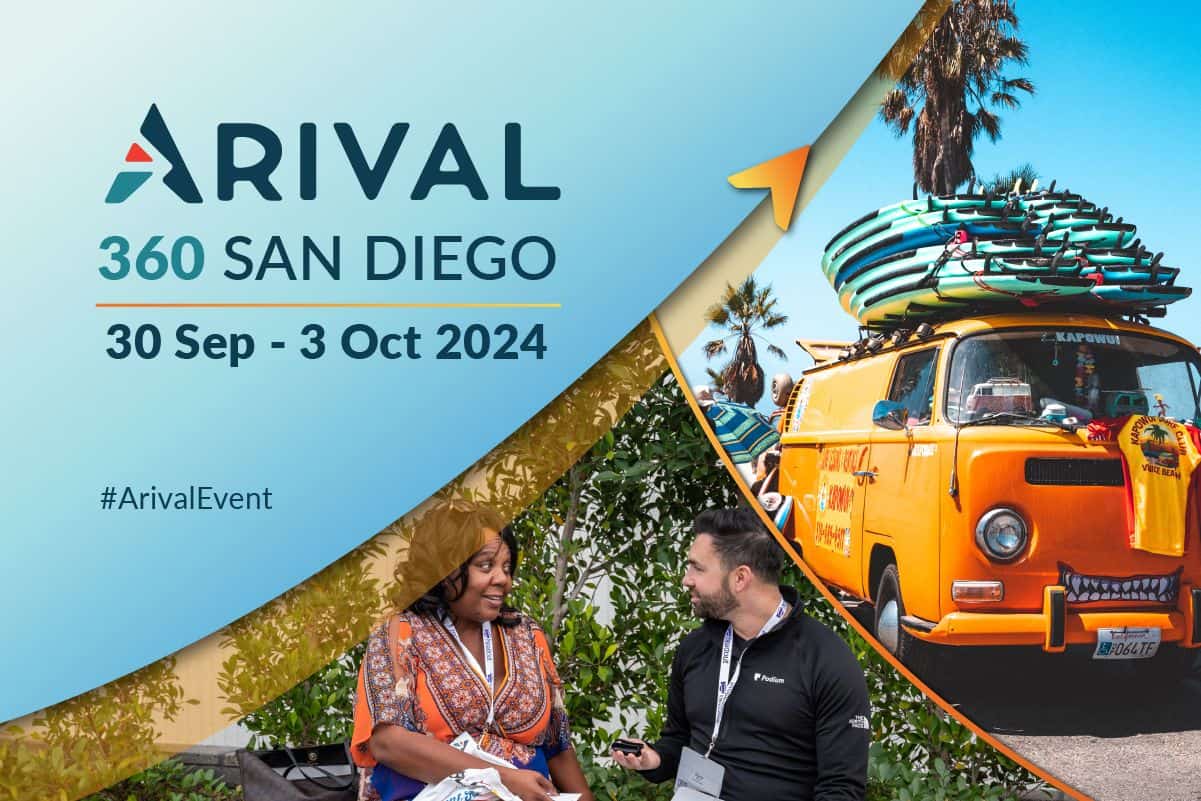
The Power of Play

“In My Travel Era” — Taylor Swift, Beyonce Usher in an Event Tourism Renaissance

The Rapid Rise of the Private Tour Taker

WINNERS ANNOUNCED: The 2024 European Arival TourReview Spotlight Awards
Already a member.
Username or Email
Remember me
Lost your password?
NEED TO REGISTER?
Included in Free Membership
Included in Arival Pro Membership
The Arival on-demand video library archive Access to the entire library of over 150 video sessions and webinars
Arival.guides Short, digestible research & trends reports delivering insights into our industry, such as The Tour Operator Outlook for 2021.
Arival.travel articles Topical articles about marketing, tech, operator business and operator stories in all areas of tours, activities & attractions & experiences
Job board access Find a job from our regular listings, post a resume to the talent network and learn strategies from the job resources articles
New webinars Helpful, instructional sessions covering subjects such as Mastering Facebook Ads, Grow Your Business and How To Work With OTAs — topics to help advance your business.
Discounts on all Arival in-person events 20% Discount on all Arival in-person events (save up to $300)* based on business type
Arival ProShield – Insurance program Access to tailored insurance solutions by Granite Insurance is available exclusively for Arival Insider Pro Access Members. Insider Pro Access Members also have access to a suite of resources from Granite Insurance including templates, forms and other informative documents.
Insiders Pro Access member exclusive webinars Paid membership-only webinars to deepen your understanding of important industry topics.
Job postings & talent directory Post jobs & connect with candidates most applicable to your business.
Private roundtables to connect, learn and engage Small, focused and intimate discussions exclusive to Arival Insider Pro Access members.
Full access to Arival’s library of in-depth reports Up to date, deep analysis of tourism topics ranging from Self-guided Tours to Sales & Distribution Trends and Outlooks, based on the data that defines the industry.
The latest on-demand videos Over 350+ on-demand videos featuring hot topics in tours, activities & attractions
Insider discounts in digital marketing, tech, e-learning, and more Save money on additional tools, services and learnings you need to run your business. Exclusive to paid members.

At Arival, we believe travel can make the world a better place. Our mission is to establish and inspire a diverse community of individuals and companies in the In-destination Industry by providing opportunities to gain insight, share knowledge and build connections. To make it possible for true collaboration, creativity, innovation, and idea exchange to thrive, we are committed to facilitating a welcoming and respectful community for all. This Conference Code of Conduct shares our community expectations and applies to all attendees, employees, exhibitors, speakers, sponsors, volunteers, and other participants at Arival- produced and sponsored events. We empower all participants in our community to actively engage in creating a friendly, inclusive and safe environment for all.
Arival’s core values include the following, and create an expectation for conduct at our events and in online community spaces:
We demonstrate a deep respect for human beings inside and outside our company and for the communities in which they live. We value integrity and strive to consistently interact with others in ways that are authentic, ethical, and fair. We are dedicated to transparency , committing to clear, open and honest communication. We actively pursue and advocate for inclusion, diversity and representation of varying cultural backgrounds, perspectives and ideas
Arival welcomes people from all cultural backgrounds, and does not discriminate on the basis of race, color, creed, gender (including pregnancy, perceived pregnancy, childbirth, breastfeeding, or related medical conditions), gender identity, religion (including religious dress and grooming), marital status, domestic partner status, genetic information, age, national origin or ancestry, military or veteran status, sexual orientation, physical or mental disability, or any other basis protected by federal, state, or local laws.
Accordingly, participants must refrain from displaying any demeaning, harassing, aggressive, or intimidating behavior or materials that would interfere with others’ experience and participation in our community.
If you witness or are subjected to inappropriate or disruptive behavior or have any other concerns, notify an Arival staff member as soon as possible.
Inappropriate or disruptive behavior will not be tolerated. Arival reserves the right to refuse entry to or remove any party from any event or community space at any time when participation or behavior create a disruption or hinder the event or enjoyment of the event by other participants. All determinations are at the sole discretion of Arival, and the decision of the Arival team will be final. Severe breaches of this Conference Code of Conduct may result in disqualification from participating in future events. Individuals expelled due to violating this Conference Code of Conduct will not be eligible for a refund or other consolation.
If you have questions regarding this Conference Code of Conduct or its implementation, please contact us at [email protected] .
Privacy Overview

+39 0473 538800 Zona industriale 1/5 - Eurocenter . 39011 Lana South Tyrol Italy [email protected] www.additive.eu . VAT-ID IT02476330218
Online travel agencies (OTAs) offer users the possibility to book their holidays online. Well-known platforms such as Booking, HRS, or Expedia provide additional information like hotel reviews, travel tips, or package holidays. Often OTAs also act as tour operators. Hotels and tourism-related businesses can register to reach potential guests. In order to do so, information such as room availability and prices must be provided. If a stay is booked through the online travel agency, usually the hotel or tourism-related business has to pay a commission fee. Nowadays the majority of reservations are made via online travel agencies, transforming them into an important distribution channel for tourism businesses.

+20 111 368 456 1
Company Sign-up
Sign-up Now
Understanding the Role of OTAs in Boosting Hotel Revenue

The Ultimate Guide to OTA Management for Hotels: Boosting Revenue and Brand Exposure
Online Travel Agencies (OTAs) are third-party booking platforms that allow travelers to book accommodations, flights, and activities. They have become a crucial part of the travel industry, and for hotels, they provide a significant opportunity to increase revenue and brand exposure. In this ultimate guide to OTA management for hotels, we will explore the benefits and challenges of using OTAs, and how hoteliers can effectively manage their OTA relationships to boost revenue and brand exposure.
Setting up Your Hotel for OTA Management
Evaluating your hotel's current OTA strategy: Before implementing any changes, it's important to evaluate your current OTA strategy. Analyze your current distribution channels, identify areas for improvement, and assess how much of your revenue is coming from OTAs.
Choosing the right OTA partners: Not all OTAs are created equal. Consider the demographics of your target audience, the OTA's commission structure, and the platform's features and functionalities before selecting the right OTA partners.
Optimizing your hotel's online presence for OTAs: OTAs rely on compelling descriptions and high-quality images to attract customers. Ensure that your hotel's website, social media, and other online profiles are up-to-date, visually appealing, and accurate.
Understanding the OTA commission structure: OTA commission structures can be complex, and it's important to understand how they impact your hotel's bottom line. Negotiate commission rates and ensure that you're getting a fair deal.
Maximizing Your OTA Presence
Creating a compelling hotel profile on OTAs: Your OTA profile is the first impression that potential guests will have of your hotel. Ensure that it's complete, accurate, and visually appealing, and highlights your hotel's unique selling points.
Optimizing your hotel's pricing and availability: Your pricing and availability can make or break your OTA presence. Optimize your rates and ensure that they're competitive and flexible enough to adapt to changing market conditions.
Leveraging OTA tools to boost your hotel's visibility: OTAs offer a range of tools and features that can help you boost your visibility and attract more bookings. Utilize tools such as promotions, packages, and add-ons to stand out from the competition.
Managing guest reviews on OTAs: Guest reviews can have a significant impact on your hotel's reputation and visibility on OTAs. Respond promptly and professionally to all reviews, both positive and negative, to show that you value your guests' feedback.
Managing Your OTA Relationships
Building a strong relationship with your OTA account manager: Your OTA account manager can be a valuable resource for optimizing your OTA presence. Build a strong relationship by communicating regularly and working collaboratively to achieve your goals.
Negotiating better terms with your OTAs: Negotiating better terms with your OTAs can help you reduce costs and increase revenue. Use your performance data to negotiate lower commission rates, higher placement, or other benefits.
Understanding your OTA contract terms and conditions: Your OTA contract is a legally binding agreement, and it's essential to understand its terms and conditions. Consult with a legal expert if needed to ensure that you're getting a fair deal.
Managing rate parity and rate integrity across all distribution channels: Rate parity and rate integrity are critical for maintaining a level playing field across all distribution channels. Ensure that your rates are consistent across all channels to avoid customer confusion and dissatisfaction.
Using Data Analytics to Drive OTA Performance
Measuring your hotel's OTA performance: It's essential to measure your hotel's performance on OTAs to know what is working and what needs improvement. Identify key performance indicators (KPIs) that are relevant to your hotel, such as the number of bookings, ADR, occupancy rate, and cancellation rate. Use OTA analytics tools to track your performance and analyze your data to identify patterns and trends.
Understanding OTA data analytics: OTA data analytics provides valuable insights into your hotel's performance and customer behavior. It can help you optimize your pricing and distribution strategies, as well as identify areas where you can improve guest satisfaction. Learn how to read and interpret OTA data analytics, and use it to make informed decisions about your hotel's OTA strategy.
Identifying areas for improvement: Analyzing your OTA data can help you identify areas where you can improve your performance. For example, if your cancellation rate is high, you may need to adjust your cancellation policy or improve your customer service. If your ADR is lower than your competitors, you may need to adjust your pricing strategy.
Creating an OTA performance dashboard: A performance dashboard is a visual representation of your hotel's OTA performance. It provides a quick and easy way to monitor your KPIs and track your progress over time. Use OTA analytics tools to create a customized dashboard that meets your hotel's needs. Share the dashboard with your team to keep everyone informed and motivated.
Implementing a Direct Booking Strategy
Understanding the benefits of direct bookings: Direct bookings offer several benefits for hotels, including higher profits, better control over your inventory, and stronger guest relationships. Learn how to leverage direct bookings to maximize your revenue and reduce your dependence on OTAs.
Creating a compelling direct booking website: Your hotel's website is your most important marketing tool. Create a user-friendly and visually appealing website that showcases your hotel's unique features and amenities. Optimize your website for search engines and mobile devices to attract more direct bookings.
Developing a direct booking marketing strategy: A successful direct booking strategy requires a comprehensive marketing plan. Use a combination of online and offline marketing channels to reach your target audience, such as social media, email marketing, and events. Create a loyalty program to reward your loyal guests and encourage repeat bookings.
Managing your hotel's reputation and online presence: Your hotel's reputation and online presence play a crucial role in your direct booking strategy. Encourage your guests to leave positive reviews on your website and social media channels. Respond to negative reviews promptly and professionally to show that you value guest feedback and are committed to improving the guest experience.
Best Practices for Successful OTA Management
Communicating effectively with your guests and otas.
In order to have a successful OTA management strategy, it is essential to have effective communication with your guests and OTAs. Keep your guests informed about any updates or changes that may affect their stay, such as rate changes or room availability. Respond promptly to any guest inquiries or complaints, as this can help to prevent negative reviews on OTAs. Make sure that your OTA account manager is aware of any changes to your inventory or pricing to ensure that your hotel's information is up-to-date.
Maintaining rate parity and rate integrity
One of the biggest challenges of OTA management is maintaining rate parity and rate integrity across all distribution channels. This means that the rates you offer on OTAs should be the same as or lower than the rates available on your hotel's website and other channels. Failure to maintain rate parity can result in penalties from OTAs and can damage your hotel's reputation. It is also important to ensure that your hotel's room types and amenities are accurately represented on OTAs to avoid guest dissatisfaction.
Developing a revenue management strategy that includes OTAs
Revenue management is the process of optimizing your hotel's pricing and inventory to maximize revenue. When it comes to OTA management, it is important to develop a revenue management strategy that takes into account the unique characteristics of OTAs. This may include adjusting your rates and availability based on demand and utilizing OTA tools and analytics to identify opportunities for optimization.
Staying up-to-date with the latest OTA trends and regulations
OTAs are constantly evolving, with new trends and regulations emerging all the time. It is important for hoteliers to stay up-to-date with these changes in order to maintain a competitive edge. Follow industry news and attend relevant conferences and events to stay informed about the latest OTA trends and regulations. Additionally, make sure to review your OTA contracts regularly to ensure that you are in compliance with any changes in regulations or policies.
Recap of the key takeaways from the guide
In this guide, we have covered everything you need to know about OTA management for hotels. We have discussed the importance of OTAs for hoteliers, the benefits and challenges of using OTAs, and how to set up your hotel for OTA management. We have also provided tips for maximizing your OTA presence, managing your OTA relationships, using data analytics to drive OTA performance, and implementing a direct booking strategy. Finally, we have discussed best practices for successful OTA management, including effective communication with guests and OTAs, maintaining rate parity and rate integrity, developing a revenue management strategy that includes OTAs, and staying up-to-date with the latest OTA trends and regulations.
Final thoughts on OTA management for hotels
While OTA management can be complex and challenging, it is essential for hoteliers to have a strong OTA strategy in order to boost revenue and brand exposure. By following the tips and best practices outlined in this guide, hoteliers can optimize their OTA performance and build successful relationships with OTAs and guests alike.
Share : Understanding the Role of OTAs in Boosting Hotel Revenue

VIDEO
COMMENTS
Updated April 2023 - Online Travel Agents (OTAs) can provide your tours and activities with massive exposure. To distribute tours and activities globally, you'll need to partner with them, so here's everything you need to know about working with OTAs, how they differ from partnering with travel agents, and the meaning of OTA in travel.
Kayak. Priceline. Orbitz. You know them, and maybe you even swear by them to book your flights or hotels. These names and many more are online travel agencies, or OTAs. From the big names to the small, these are some of the most popular flight search engines to hunt for a bargain. And while we tell readers that there's no search engine out ...
An online travel agency (OTA) is a website that acts as a search engine for travel. They connect providers across the travel industry to help travelers easily plan their trips. On OTA sites, travelers can often access package deals with accommodations, airfare, cruises, rental cars, and more. Over the years, online travel agencies (OTAs) have ...
Online travel agencies are companies that sell you flights, online. They act as a middleman between airlines and consumers, though their prices can often be cheaper than booking direct. Most people are familiar with top OTAs like Expedia, Orbitz, Travelocity, Hopper, and Priceline. There are hundreds, if not thousands, of smaller OTAs as well ...
An online travel agency (OTA) arranges and sells accommodations, tours, transportation and trips on an online platform for travelers. They are third parties who sell services on behalf of other companies. Usually, these OTAs offer many benefits with added convenience with more of a self-service approach. They also include a built-in booking ...
An online travel agency (OTA) is a web-based marketplace that allows consumers to research and book travel products and services, including hotels, flights, cars, tours, cruises, activities and more, directly with travel suppliers. Every day, millions of travelers around the world use OTAs to plan leisure and business travel.
An Online Travel Agency (OTA) is an online or app-based marketplace where consumers can browse, book, and pay for hotel rooms, transportation, lodging, airfare, restaurants, and experiences. Customers book directly with the OTA and the OTA confirms with the service provider. Therefore, the OTA has a relationship with the customer, not the ...
An online travel agency is a website where travelers can book flights, hotels, rental cars, cruises, tours, vacation packages, short term rentals, and more. The first OTAs launched in 1996: Travelocity, which stemmed from a partnership between American Airlines and Sabre, and Expedia, which was created from a partnership between Microsoft and ...
17. eDreams. eDreams is a Barcelona, Spain-based OTA offering flights, hotels, car rentals, holiday packages, and travel insurance. The company currently operates in 40 countries, including Spain, Italy, France, Portugal, the UK, and the U.S. In 2011, eDreams became the first international OTA to expand into Turkey.
An OTA (Online Travel Agency) is a website or platform that allows travelers to book travel-related services such as flights, hotels, rental cars, and vacation rentals. Learn more about OTAs, how they work, and how property managers can use them for maximum benefit.
OTAs also offer personalized recommendations based on the user's interests and traveling patterns. There's no doubt that the trend of travel bookings are moving online: 90% of travelers conduct their research online. 82% of travelers end up booking online. 76% of hotel shoppers book online via OTA. A survey revealed the top 10 reasons ...
The definition of an online travel agency (OTA) is a website that sells travel-related products, including airline tickets, car rentals, cruises, experiences, accommodations and more. ... An OTA allows vendors in the travel industry like vacation rental owners and managers to list and advertise their products, usually free of charge. ...
"Historically, OTAs have contributed a significant amount of value to the tourism industry and the overall economy — from the spend generated by OTA travelers, to the number of jobs generated ...
Download the guide. To ensure you're able to strategize and build the best distribution mix for your property, it's a good idea to keep up to date with the latest news and opportunities. Here, we share some of the major OTA trends from 2023 that we expect to impact the distribution landscape into 2024. 1. OTAs are back and stronger than ever.
A healthy mix of OTA listings, metasearch advertising, social media promotions, email campaigns, travel host agency services, and partnerships with local businesses, is a good approach for hoteliers. Let's start at the beginning. What is the definition of OTA in the hospitality industry? OTA equals Online Travel Agency.
After ending 2020 down 58%, U.S. OTA bookings nearly doubled despite the ups and downs of another pandemic year. According to Phocuswright's latest travel research report on the segment U.S. Online Travel Agency Market Report 2021-2025, OTAs delivered $65.2 billion in gross bookings in 2021, reaching 82% of pre-pandemic levels (2019). Three ...
The 2019 OTA share of that figure is less than 5%. ... There are several reasons, but here is the most important: day tour operators and OTAs are focused on the travel and tourism market. Our industry surveys also focus on tourism. So if you are a day tour operator serving tourists in a leisure tourism destination, that 32% figure is the ...
What is the meaning / definition of OTA, in the hospitality industry?. OTA stands for: Online Travel Agency.. OTAs are online companies whose websites allow consumers to book various travel related services directly via Internet. They are 3rd party agents reselling trips, hotels, cars, flights, vacation packages etc. provided / organised by others.
OTA. Online travel agencies (OTAs) offer users the possibility to book their holidays online. Well-known platforms such as Booking, HRS, or Expedia provide additional information like hotel reviews, travel tips, or package holidays. Often OTAs also act as tour operators. Hotels and tourism-related businesses can register to reach potential guests.
The emergence in the past 20 years of online travel agencies as a distribution partner has had a profound effect on the hotel industry. That relationship continues to grow and change.
Online Travel Agencies (OTAs) are third-party booking platforms that allow travelers to book accommodations, flights, and activities. They have become a crucial part of the travel industry, and for hotels, they provide a significant opportunity to increase revenue and brand exposure.
1. The growth of Online Travel Agencies (OTAs) over the last decade has posed both real opportunities and major risks for the hospitality industry. These positives and challenges are particularly pronounced for independent properties around the world - both larger hotels/resorts and smaller, owner operators. Such properties, regardless of ...
A definition of ota as used in the travel industry. To find the abbreviation, acronym, or term you're looking for, use the Search box (below) or click on any letter (above).